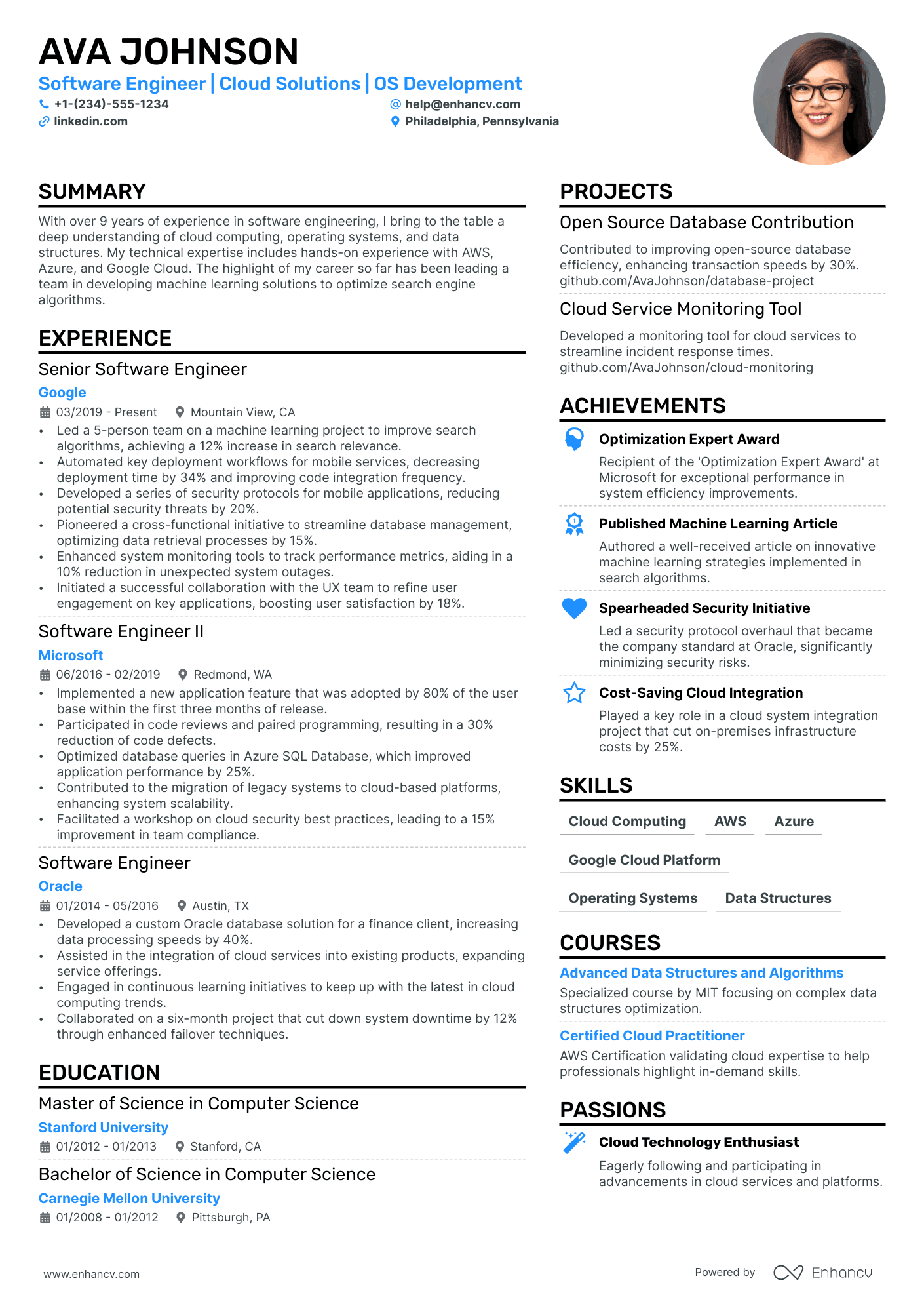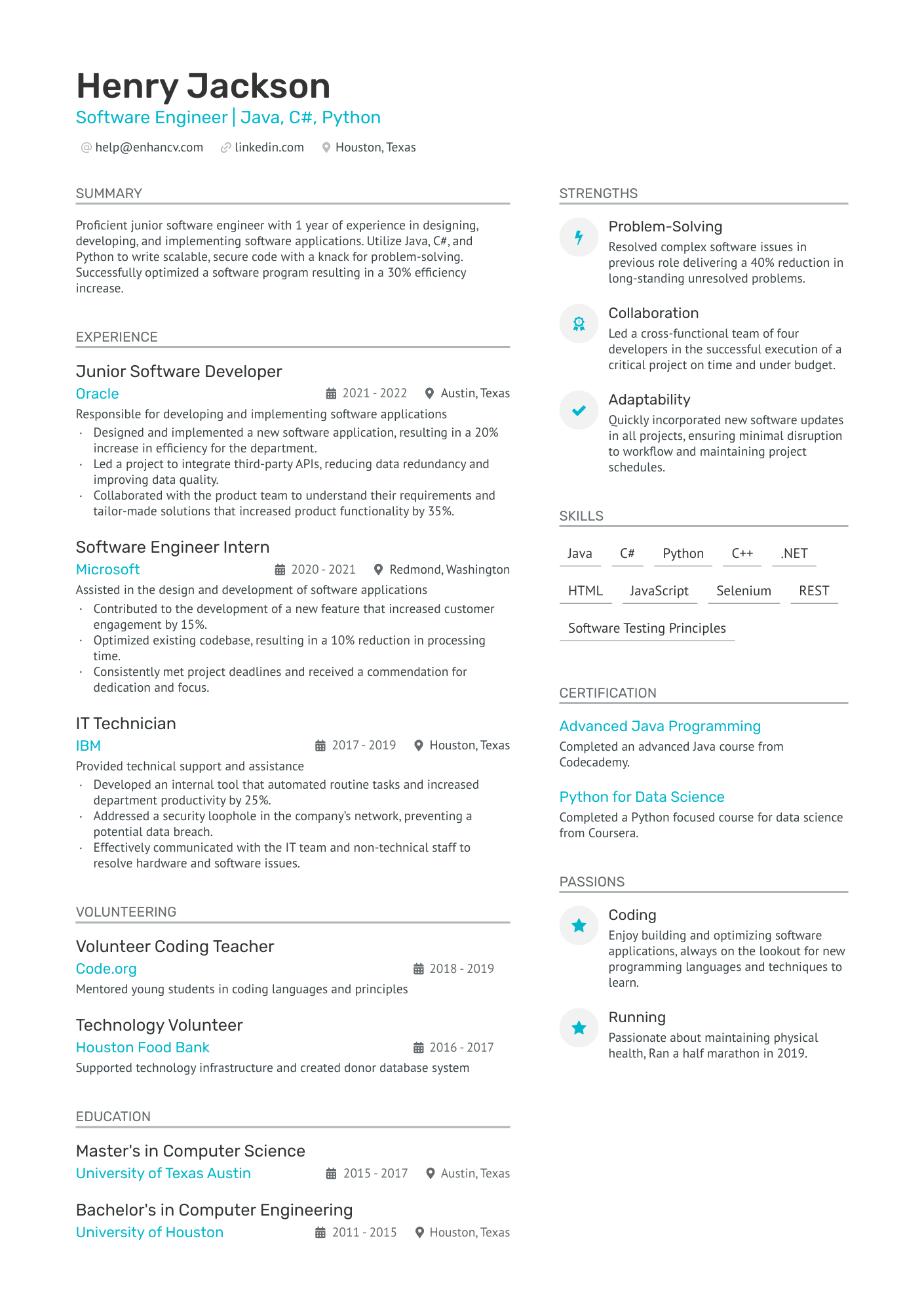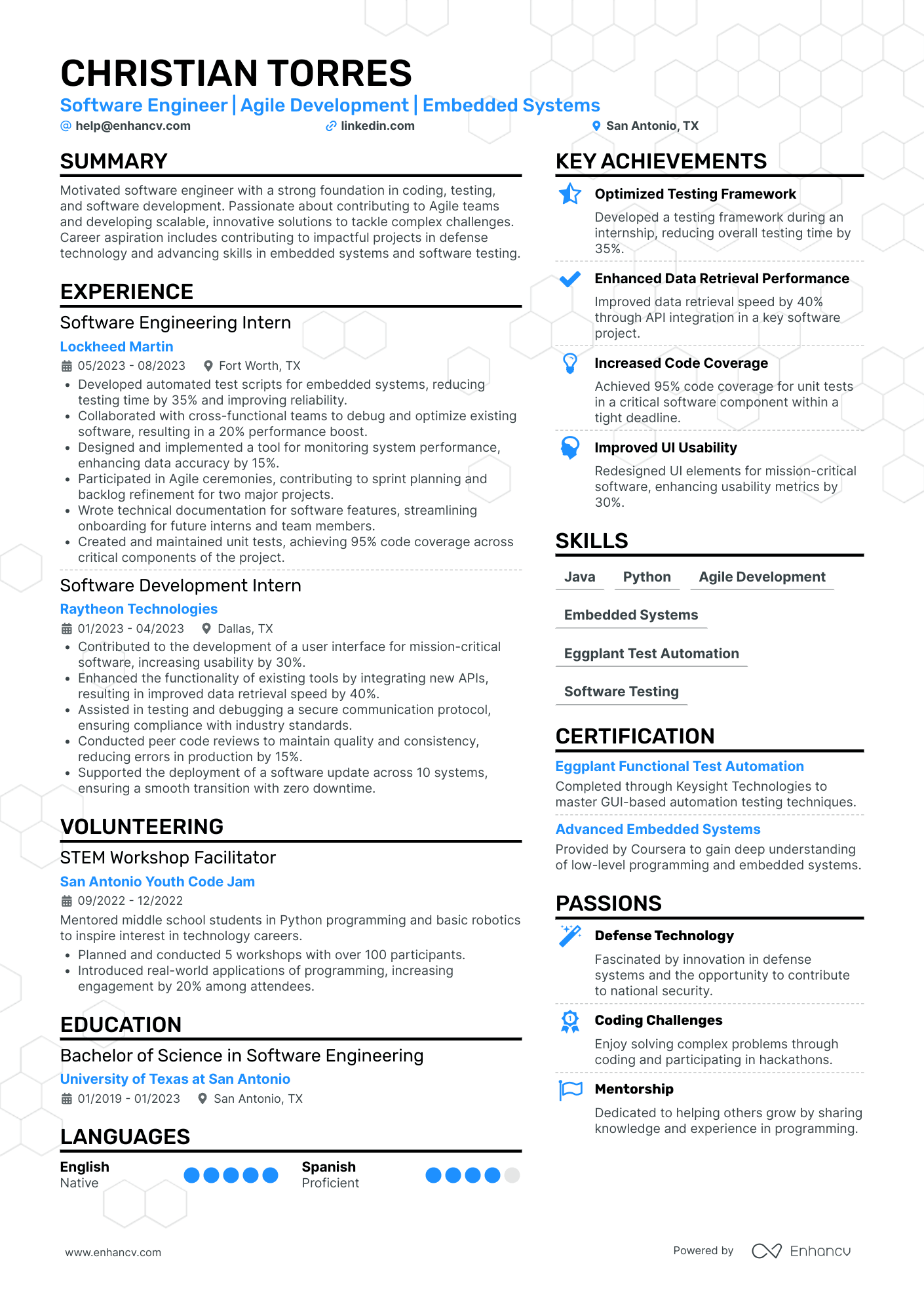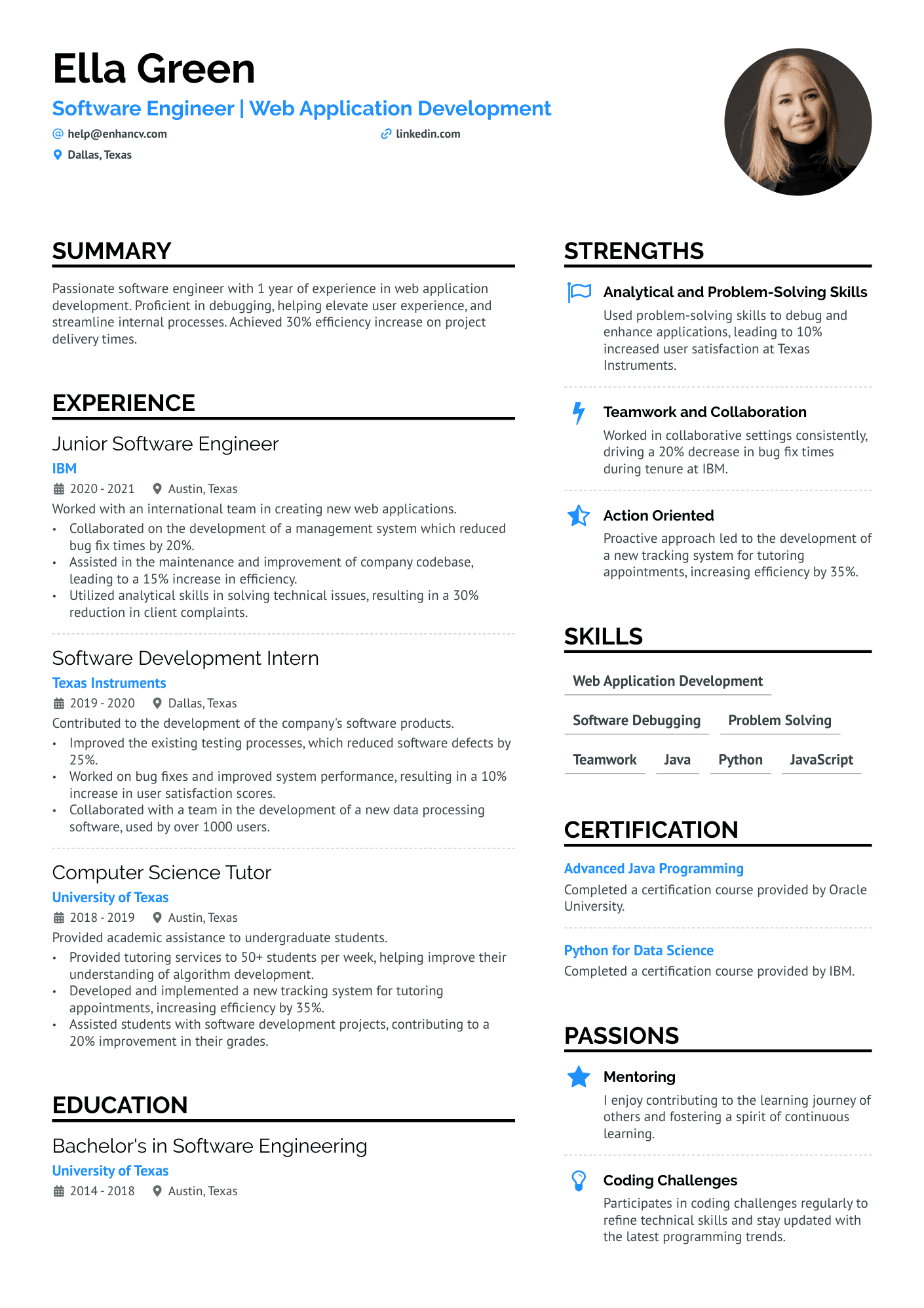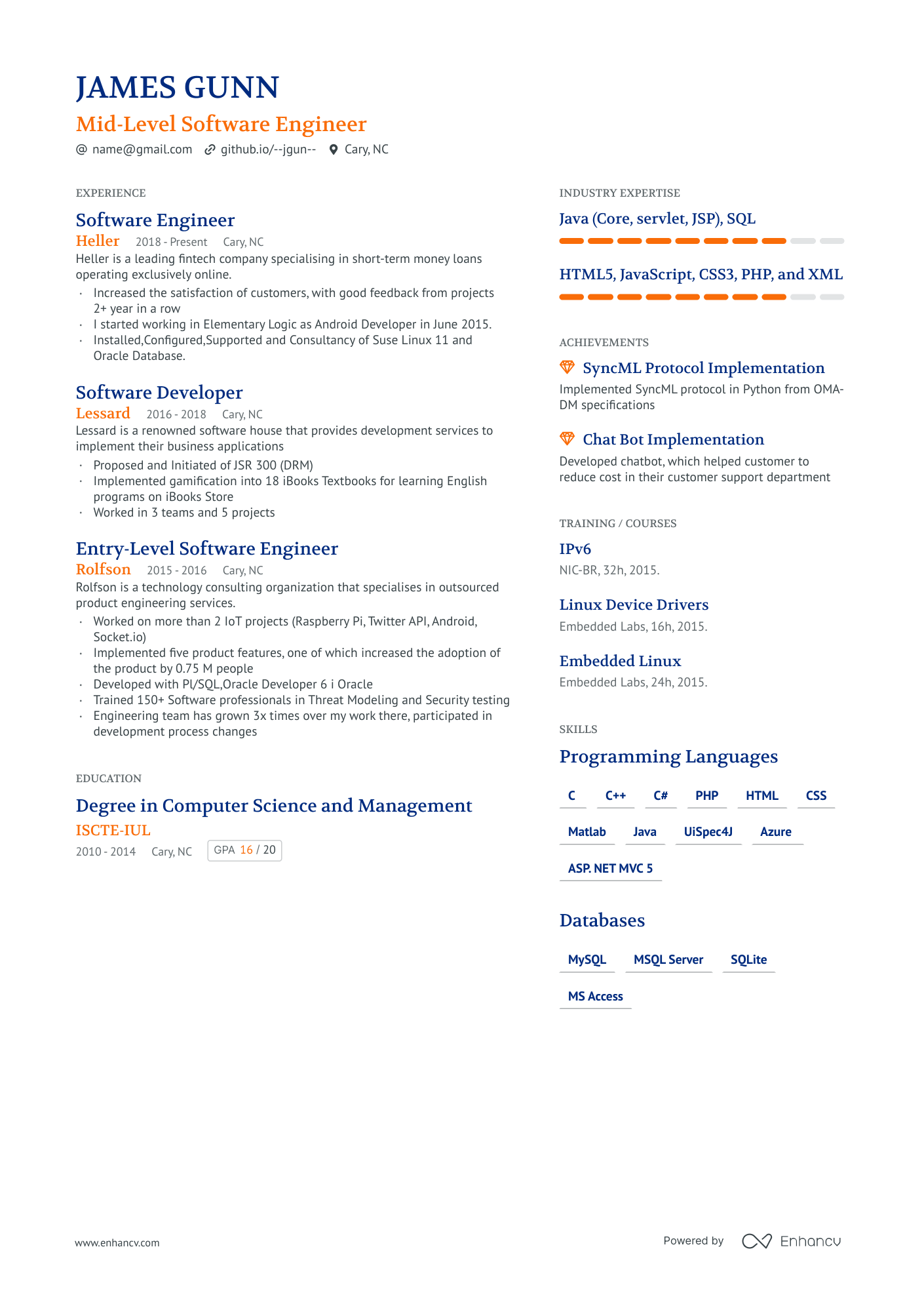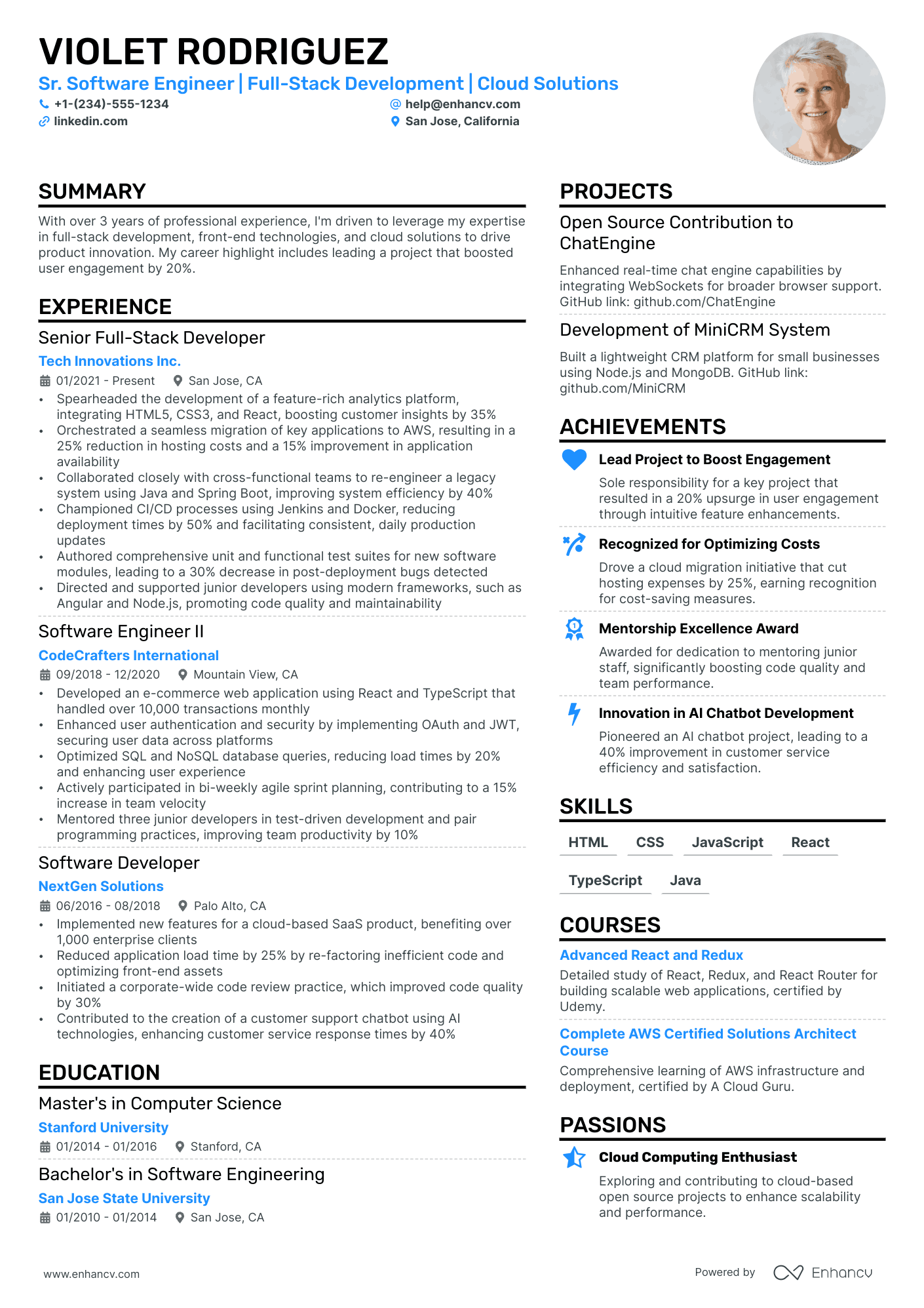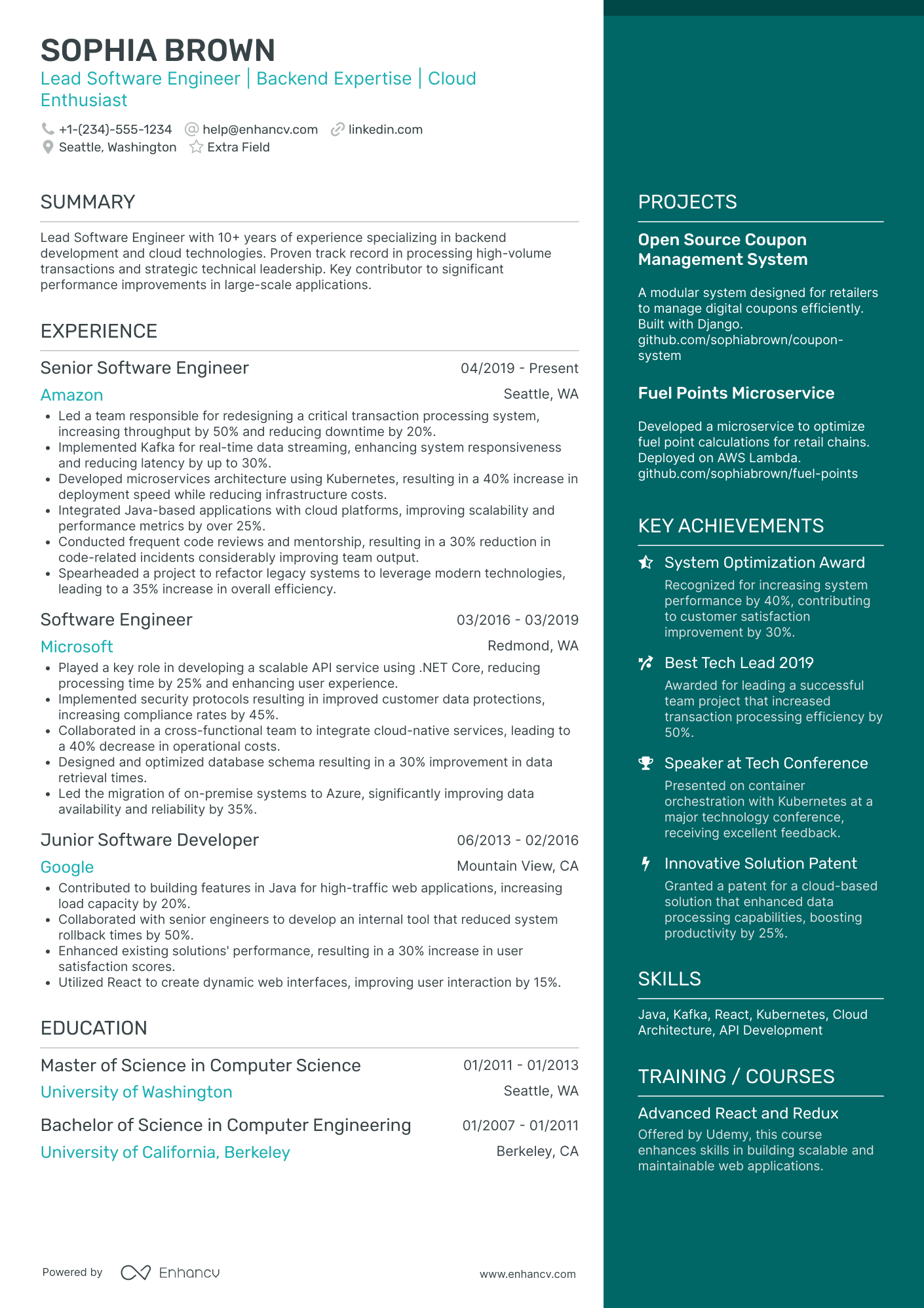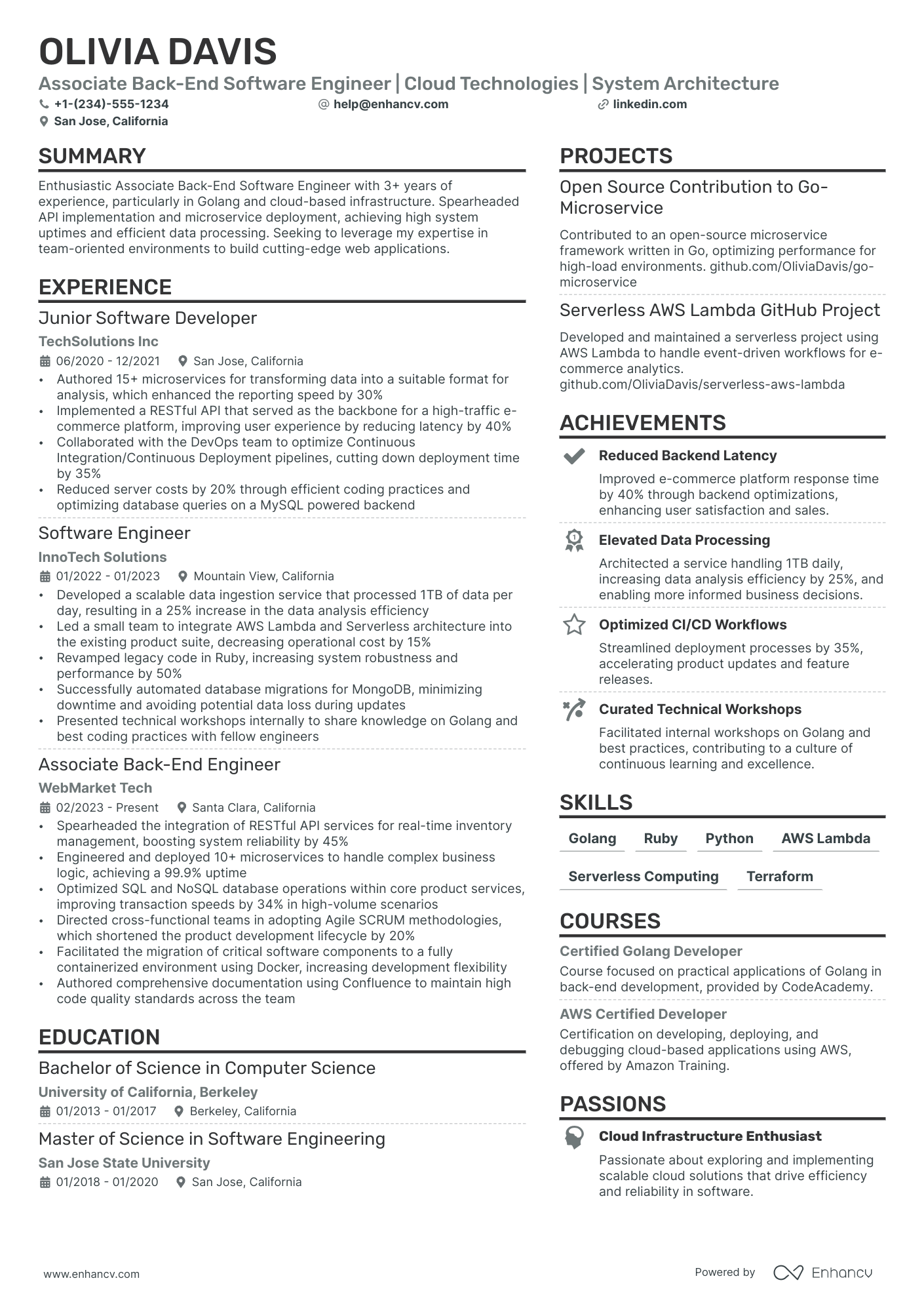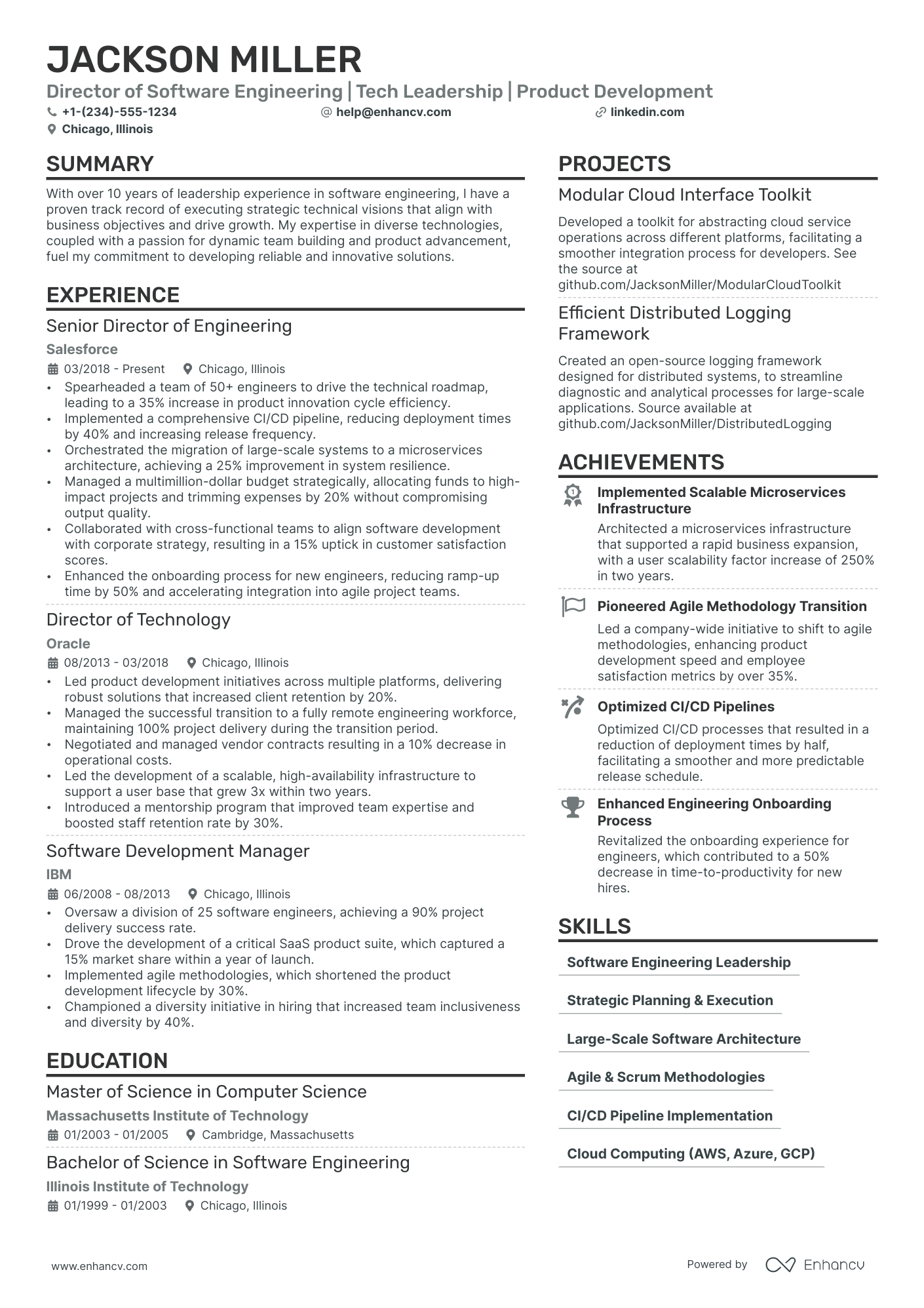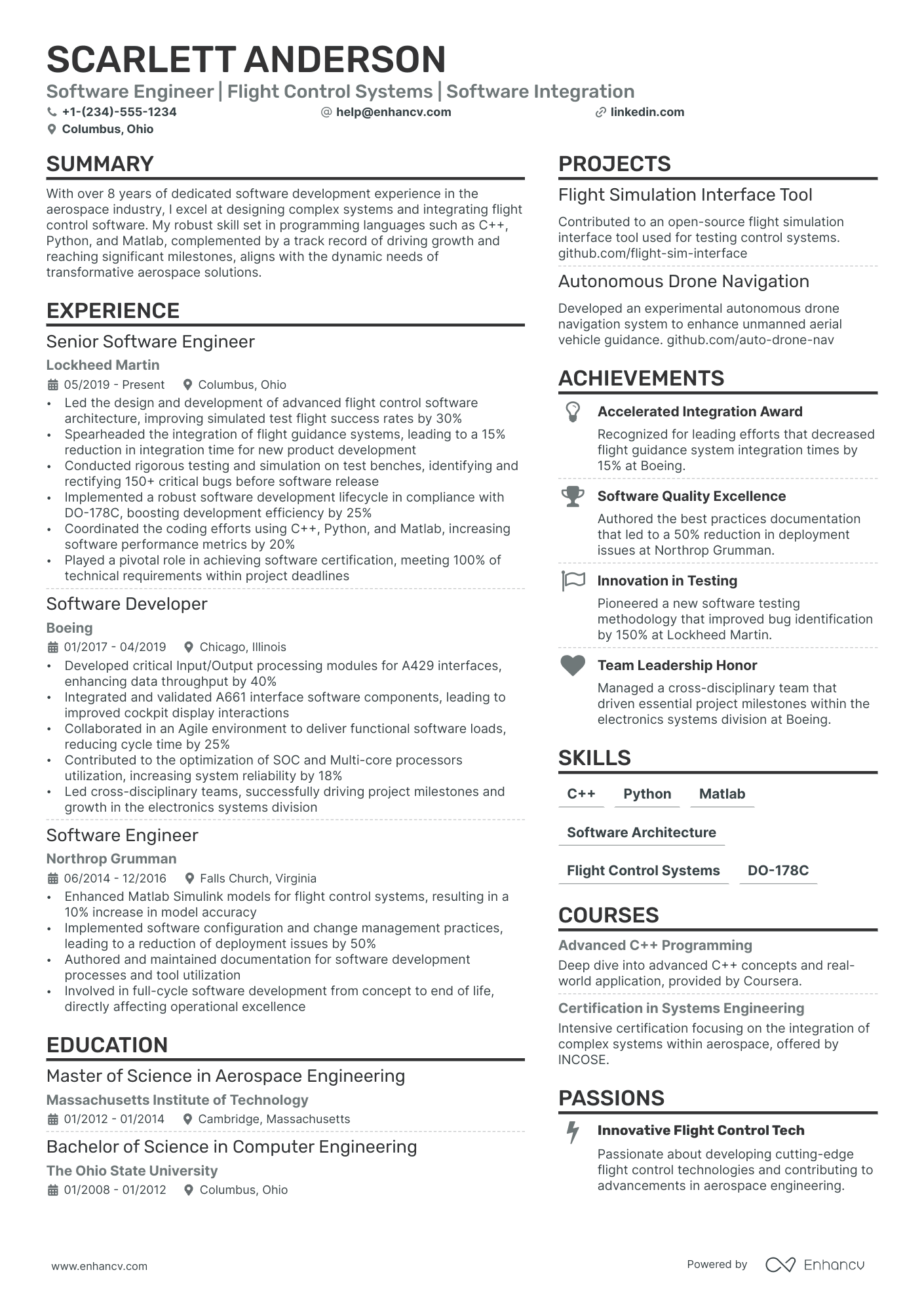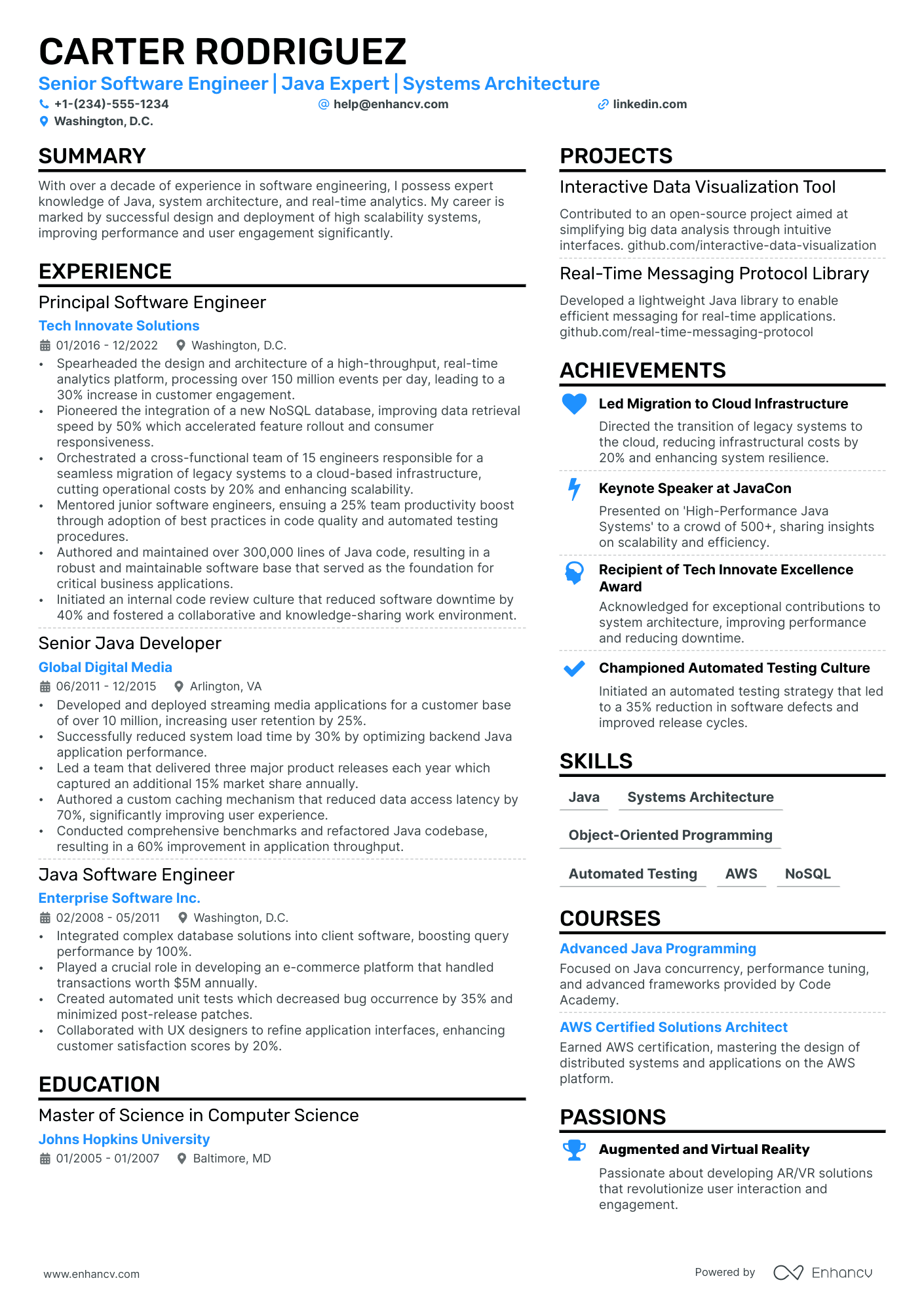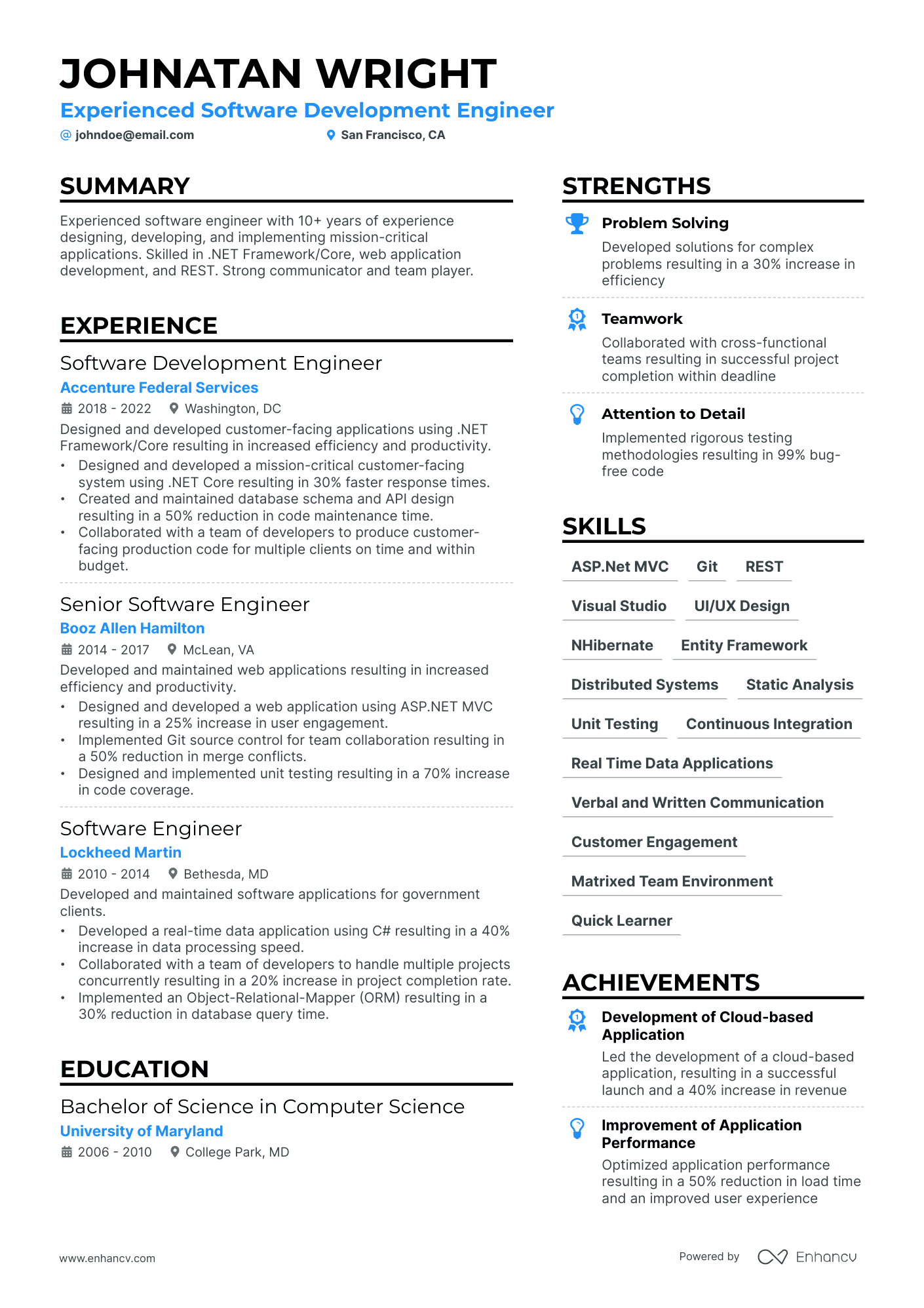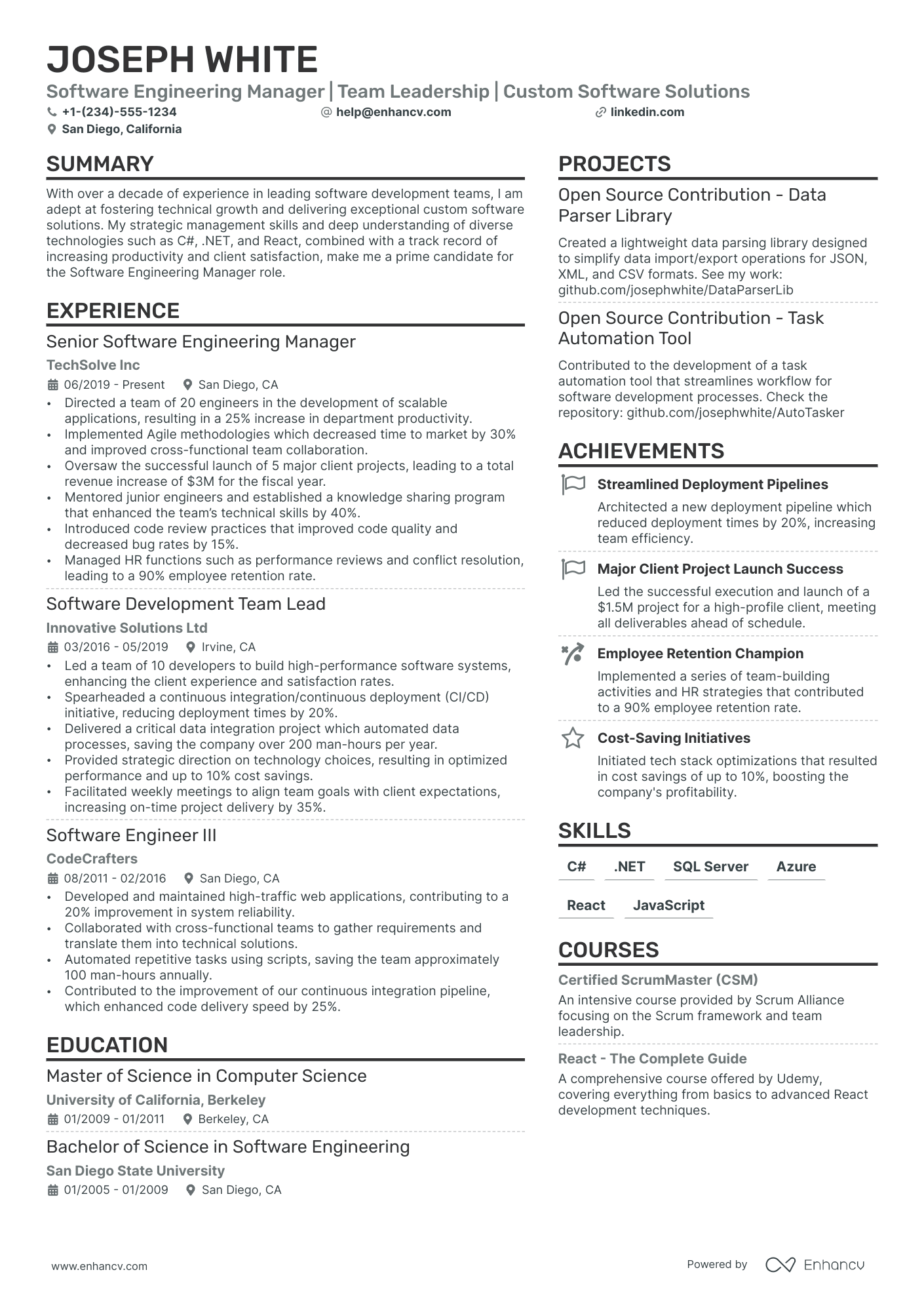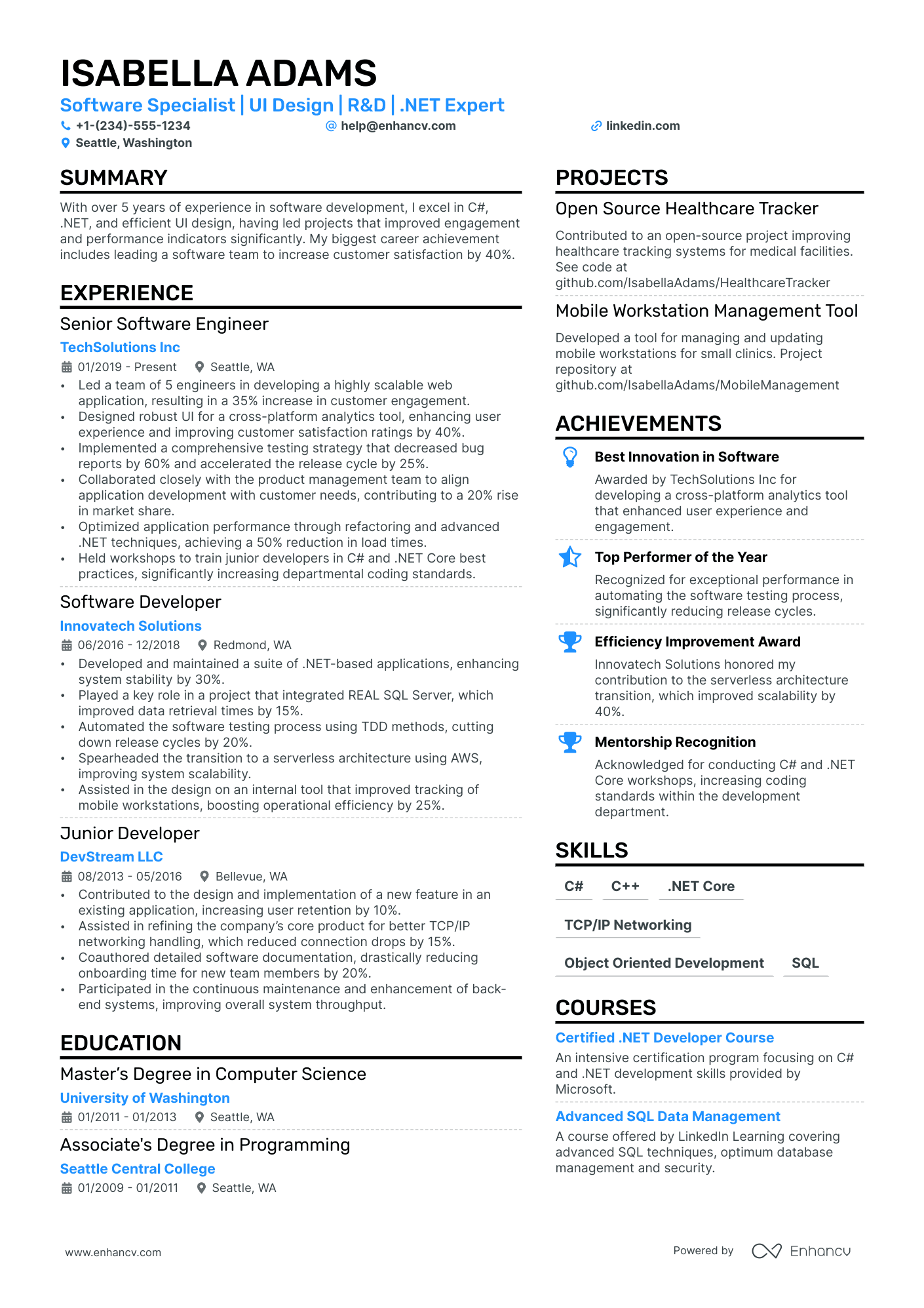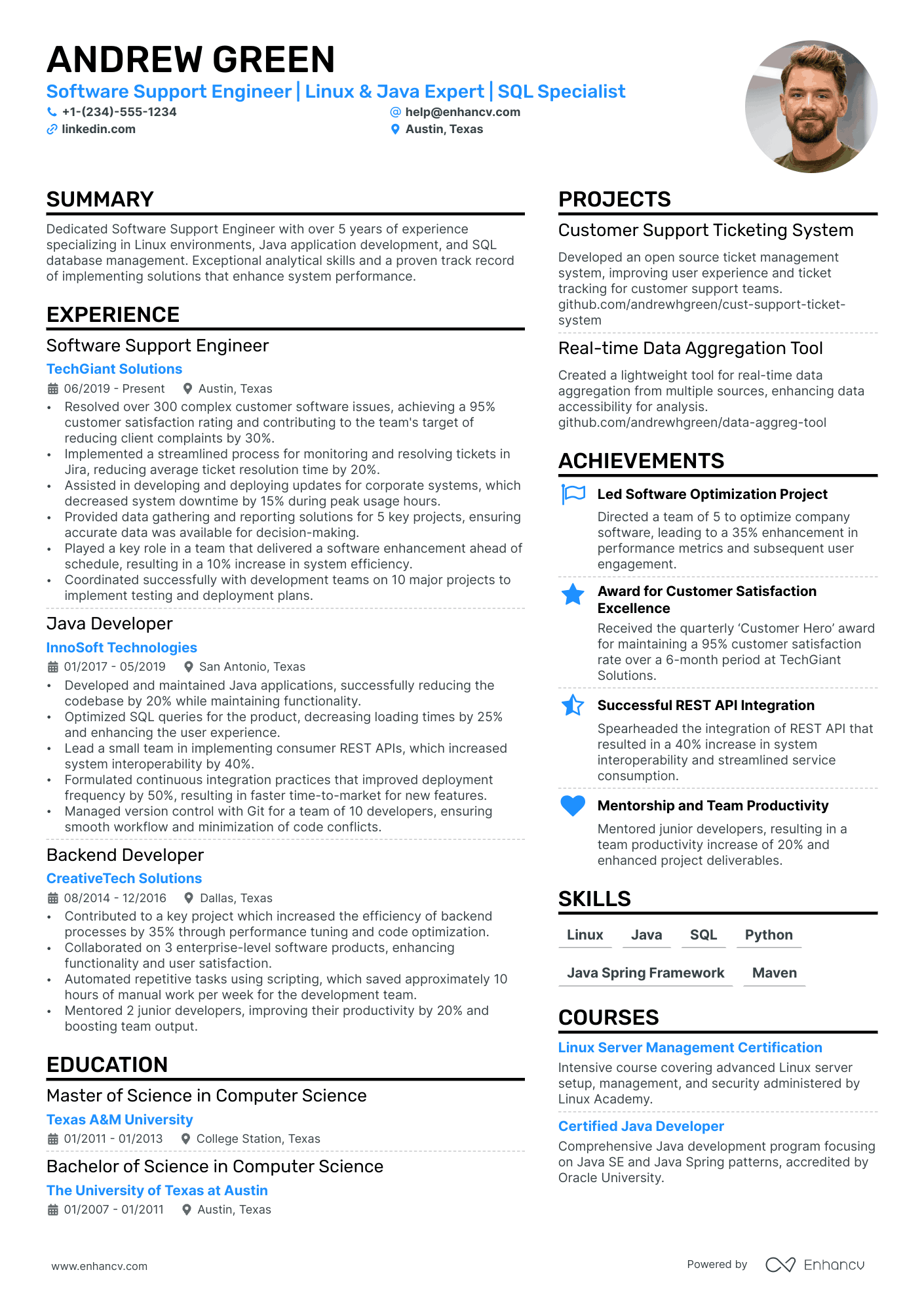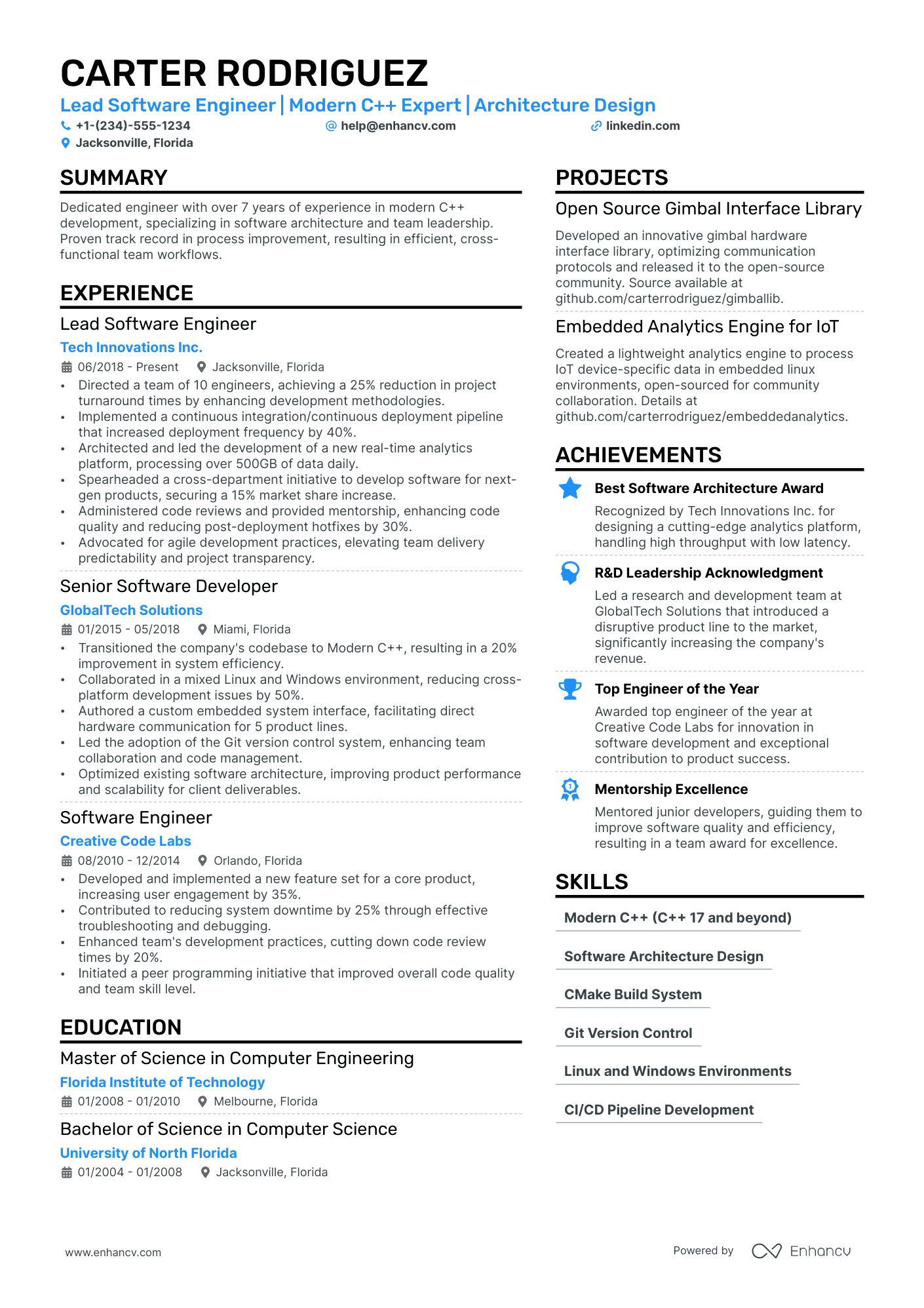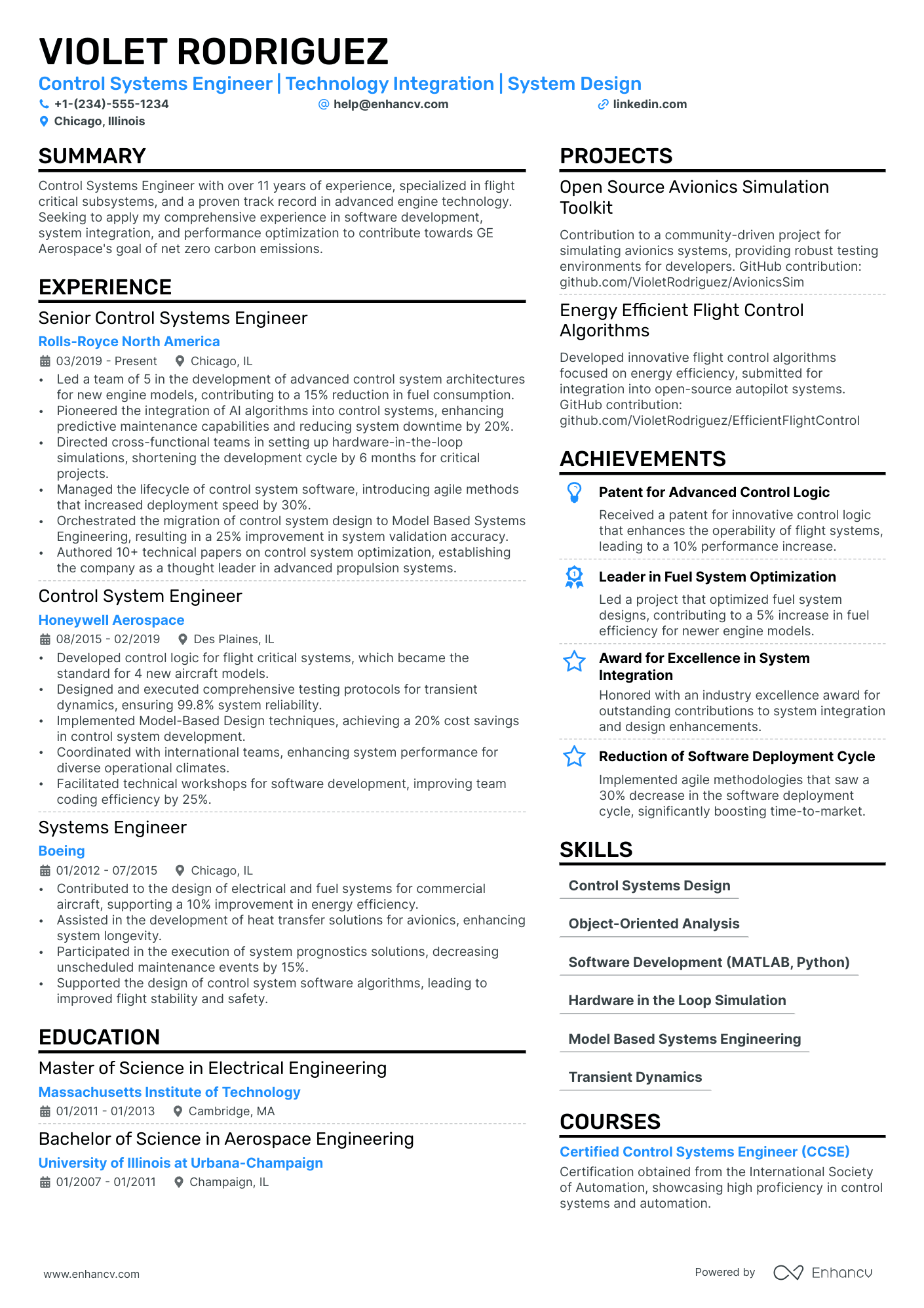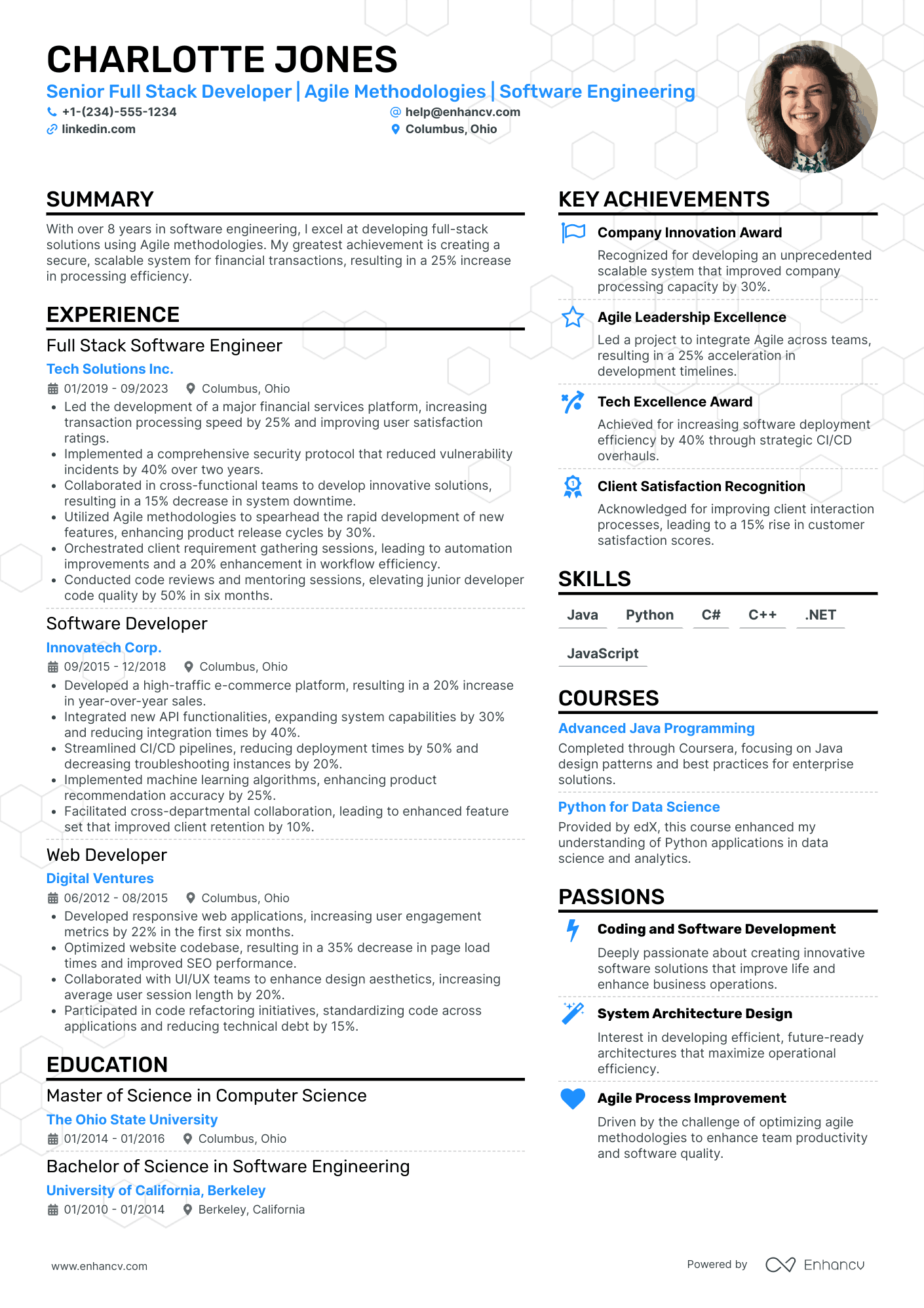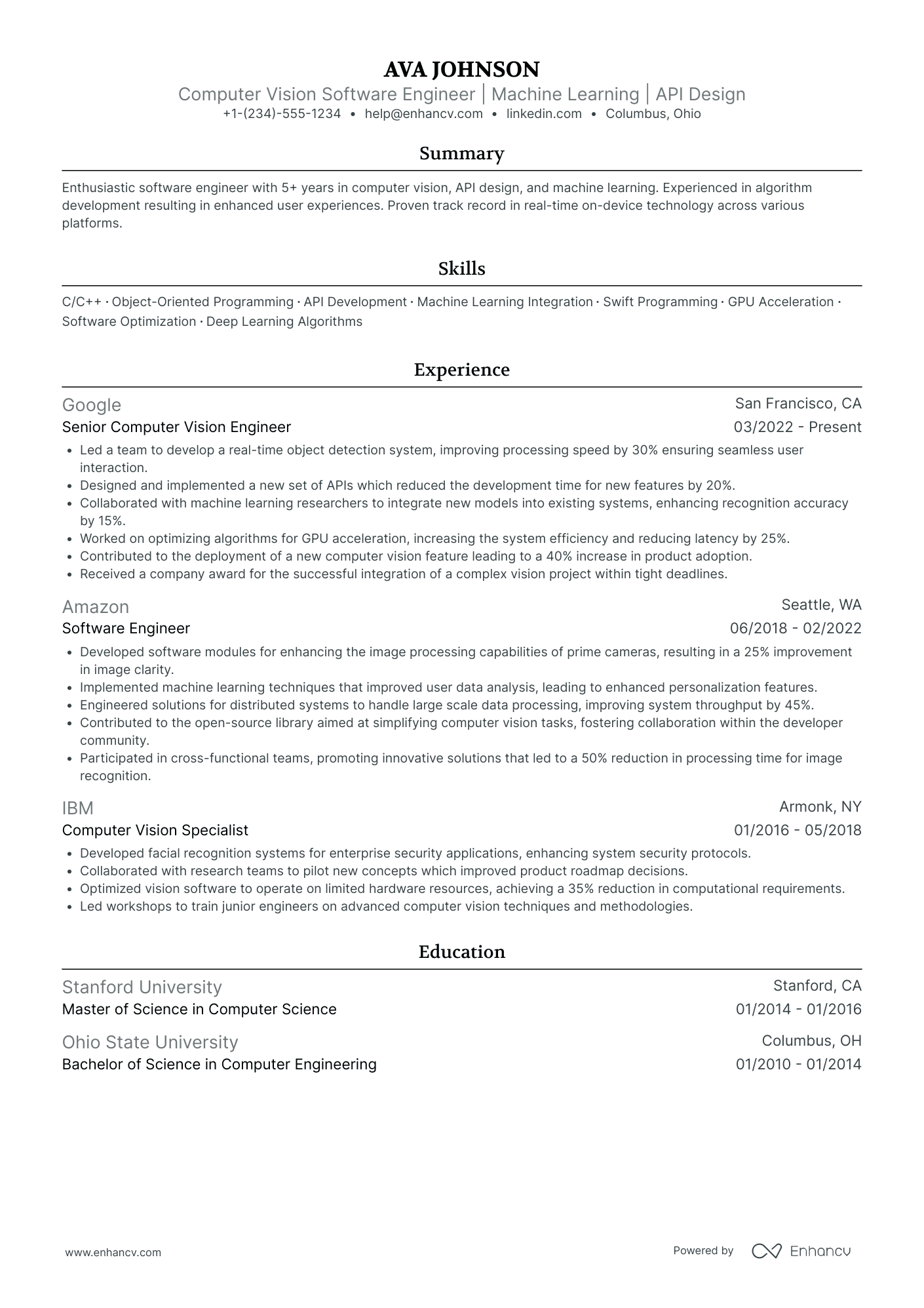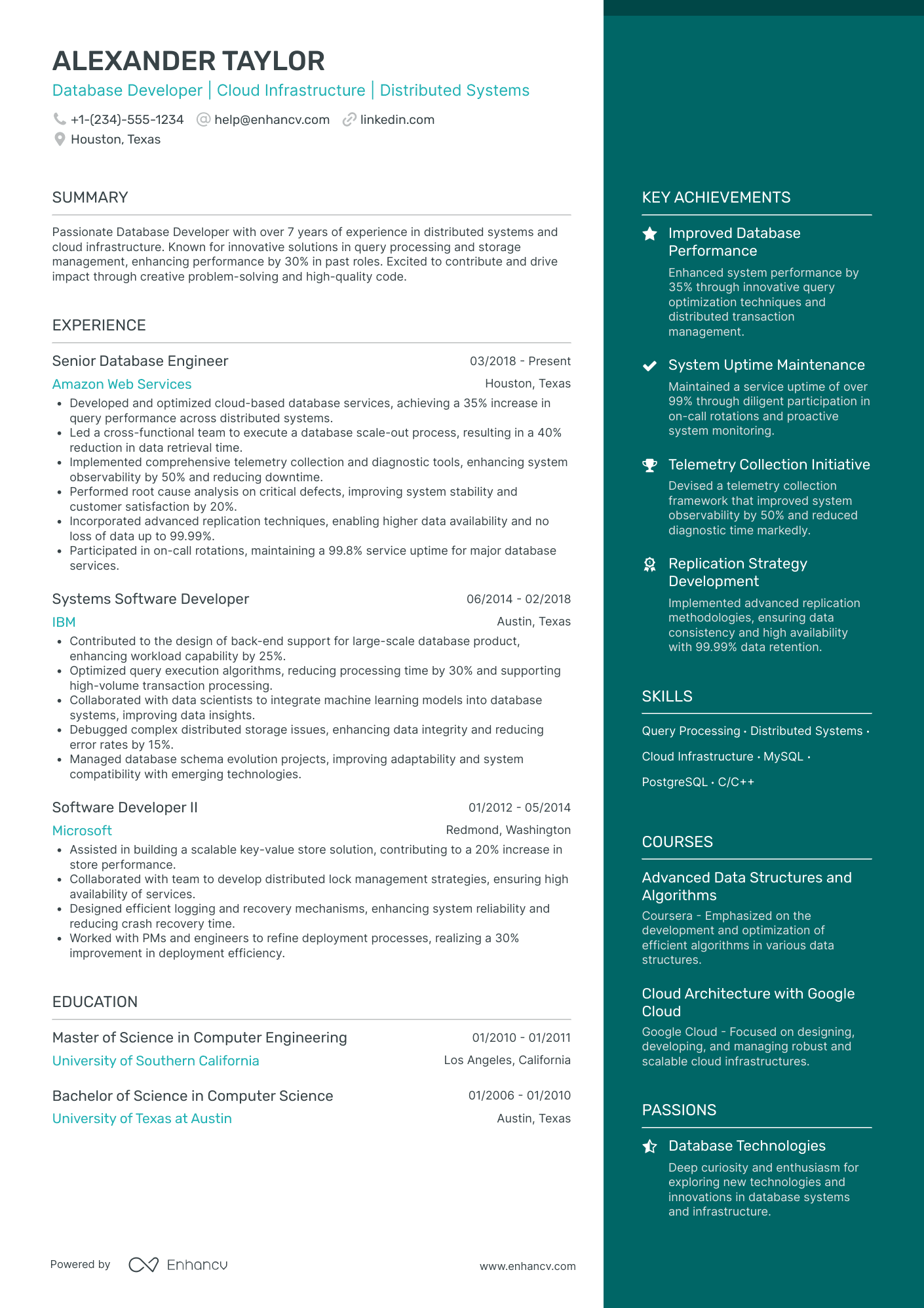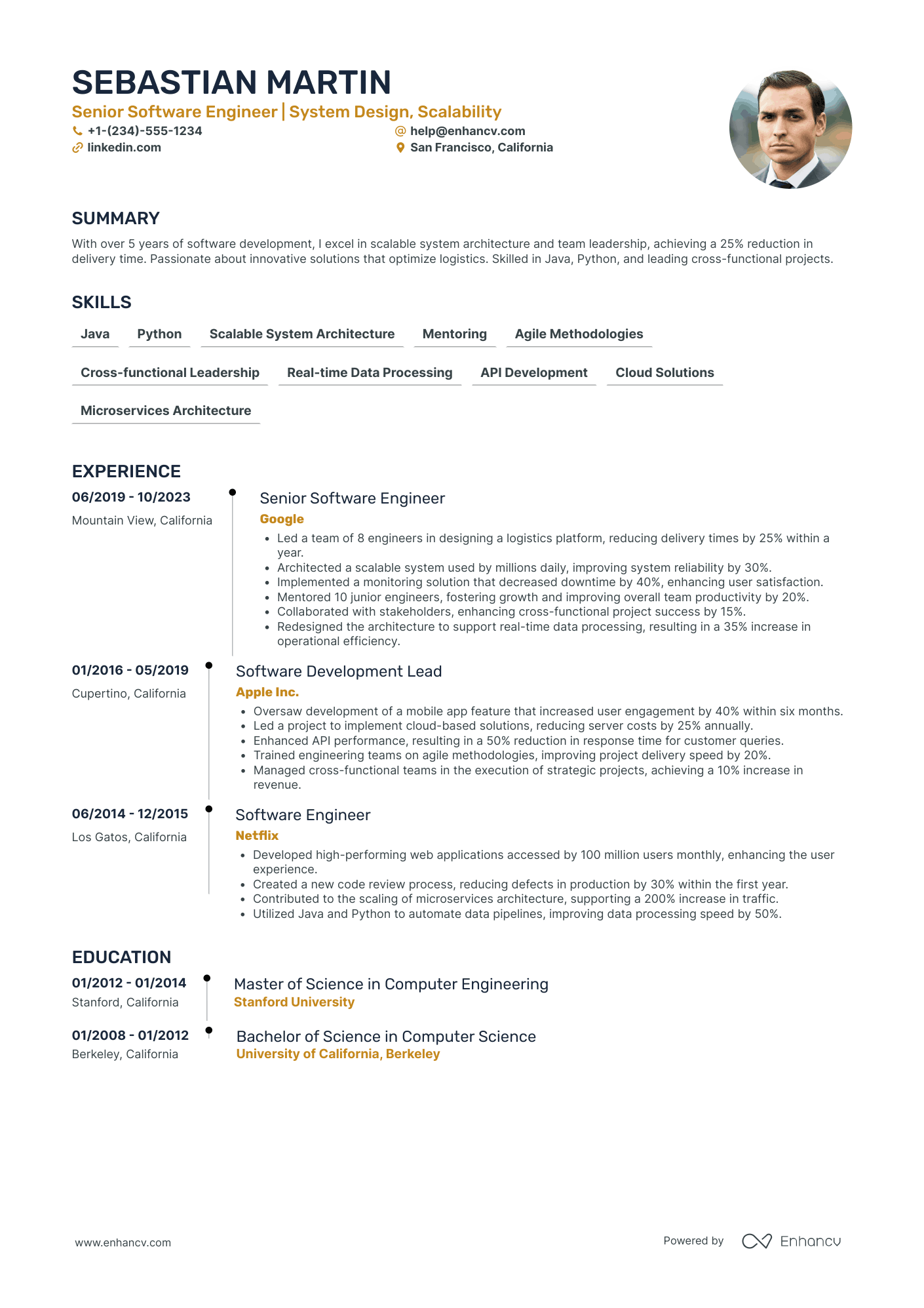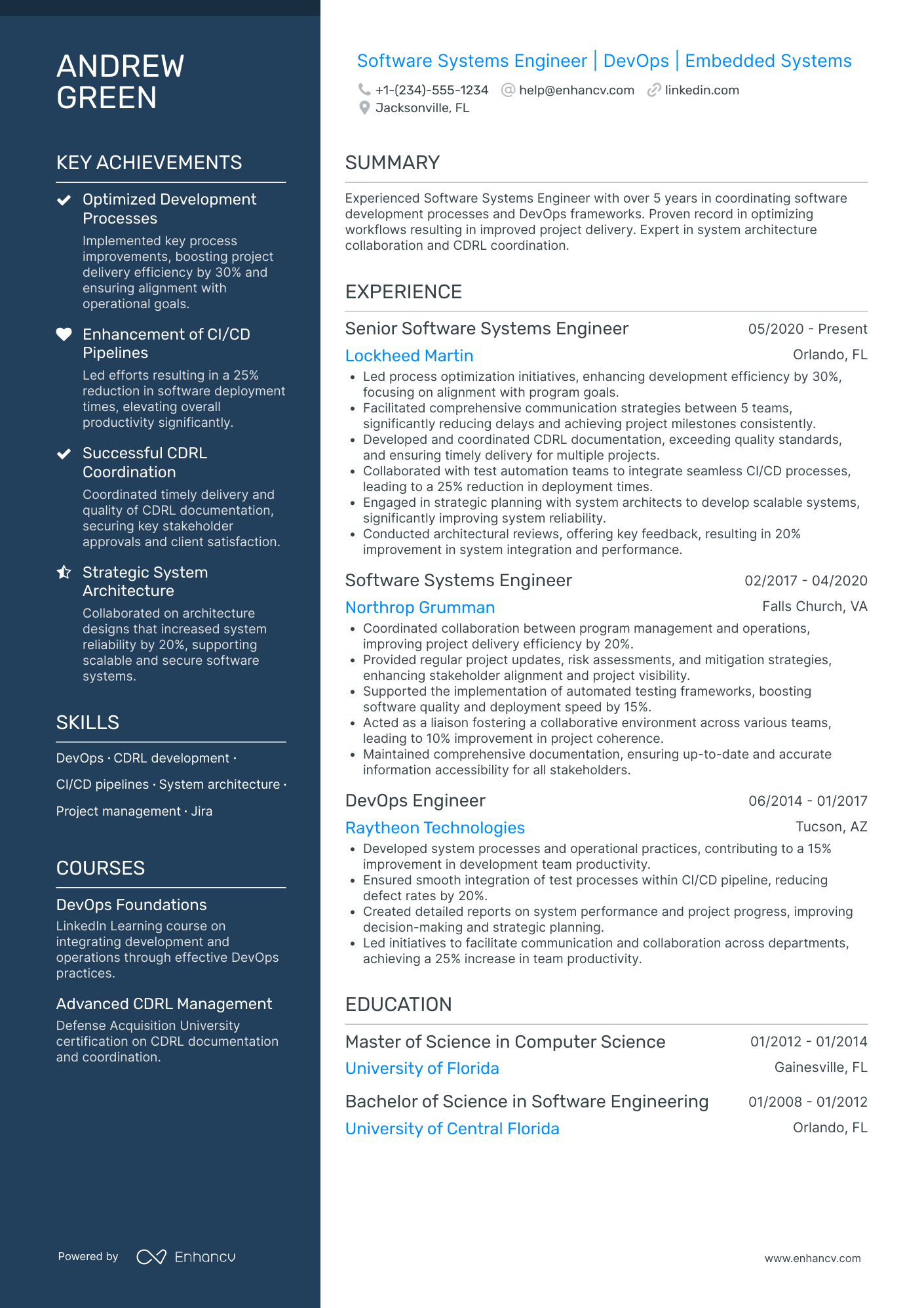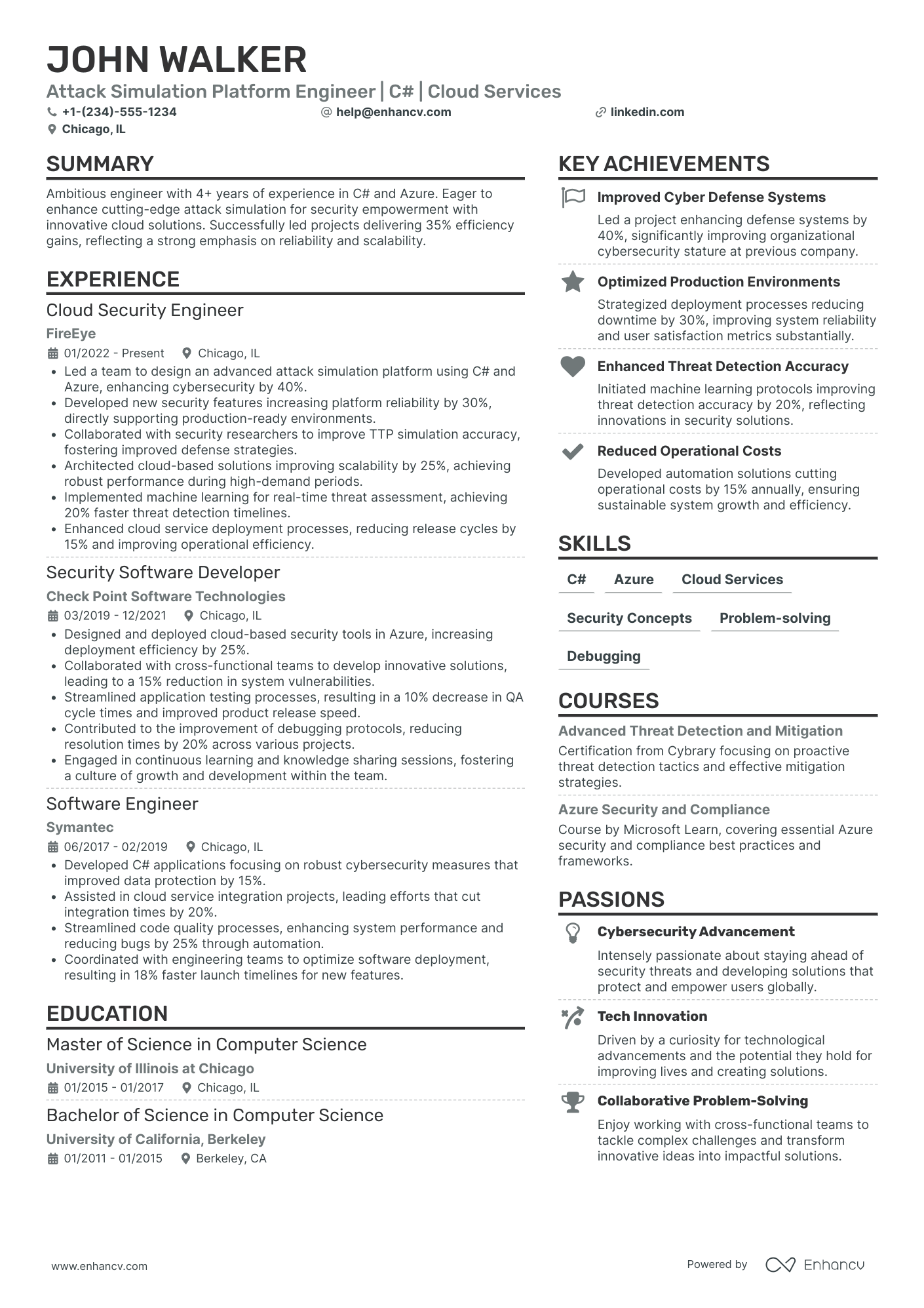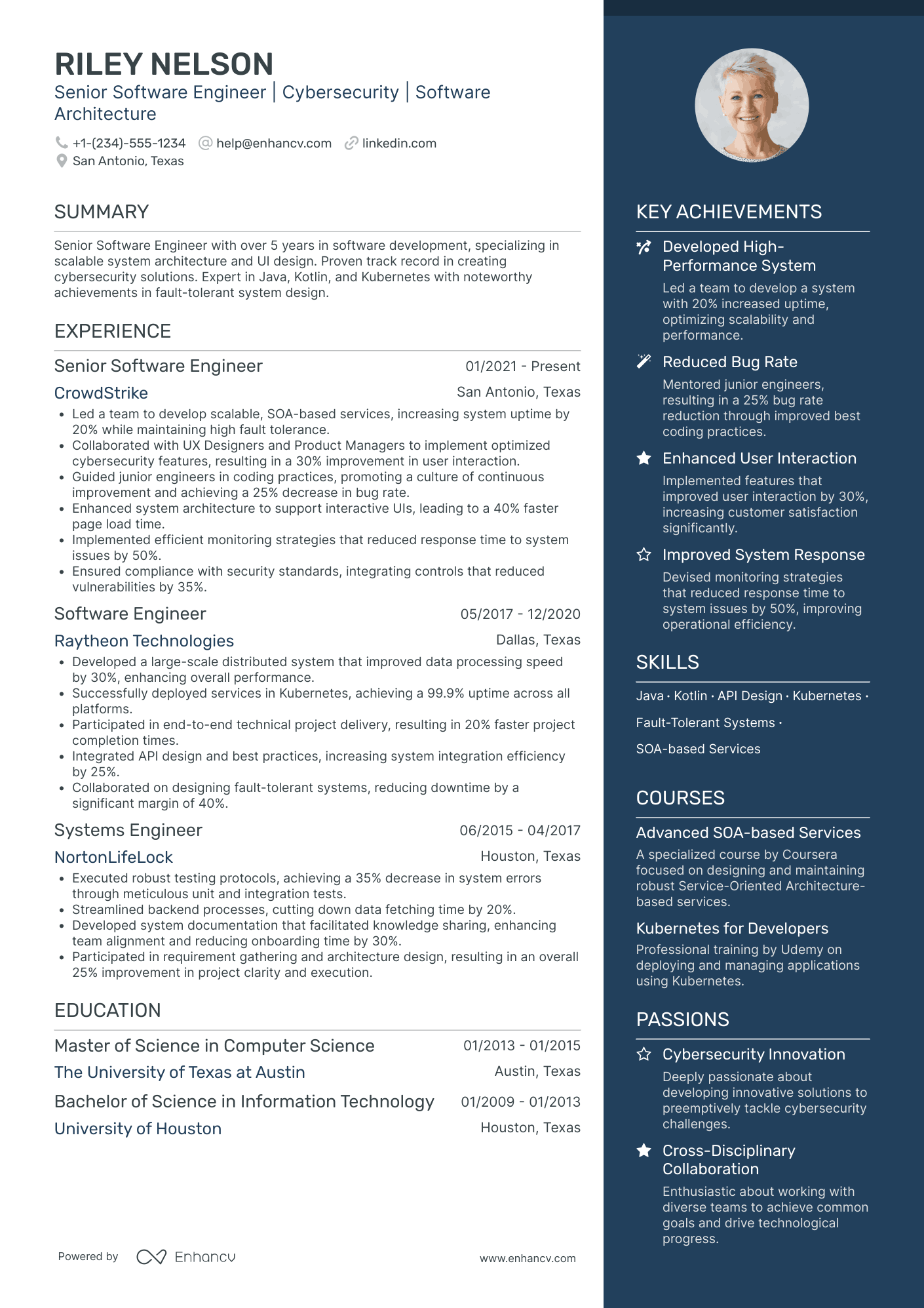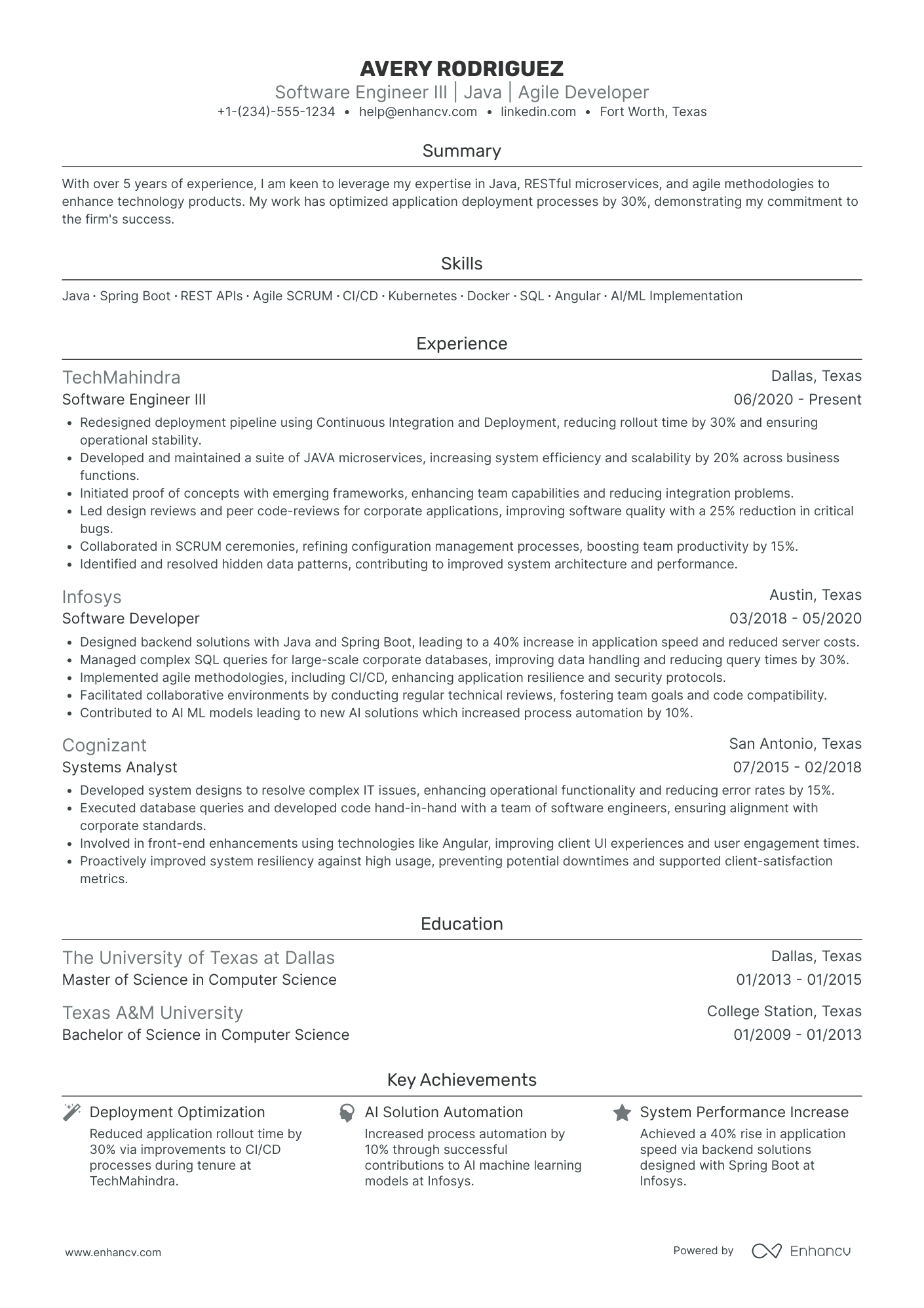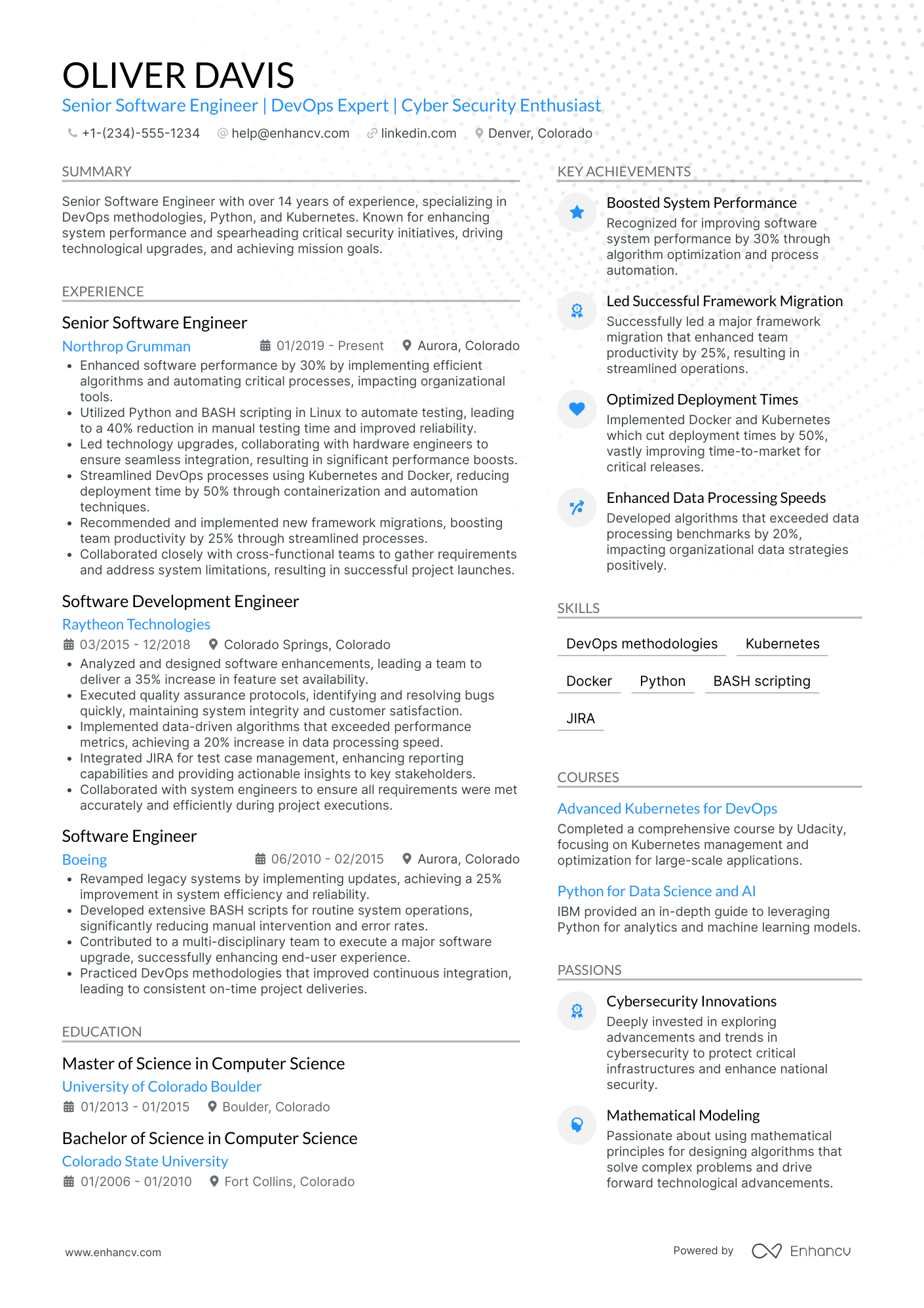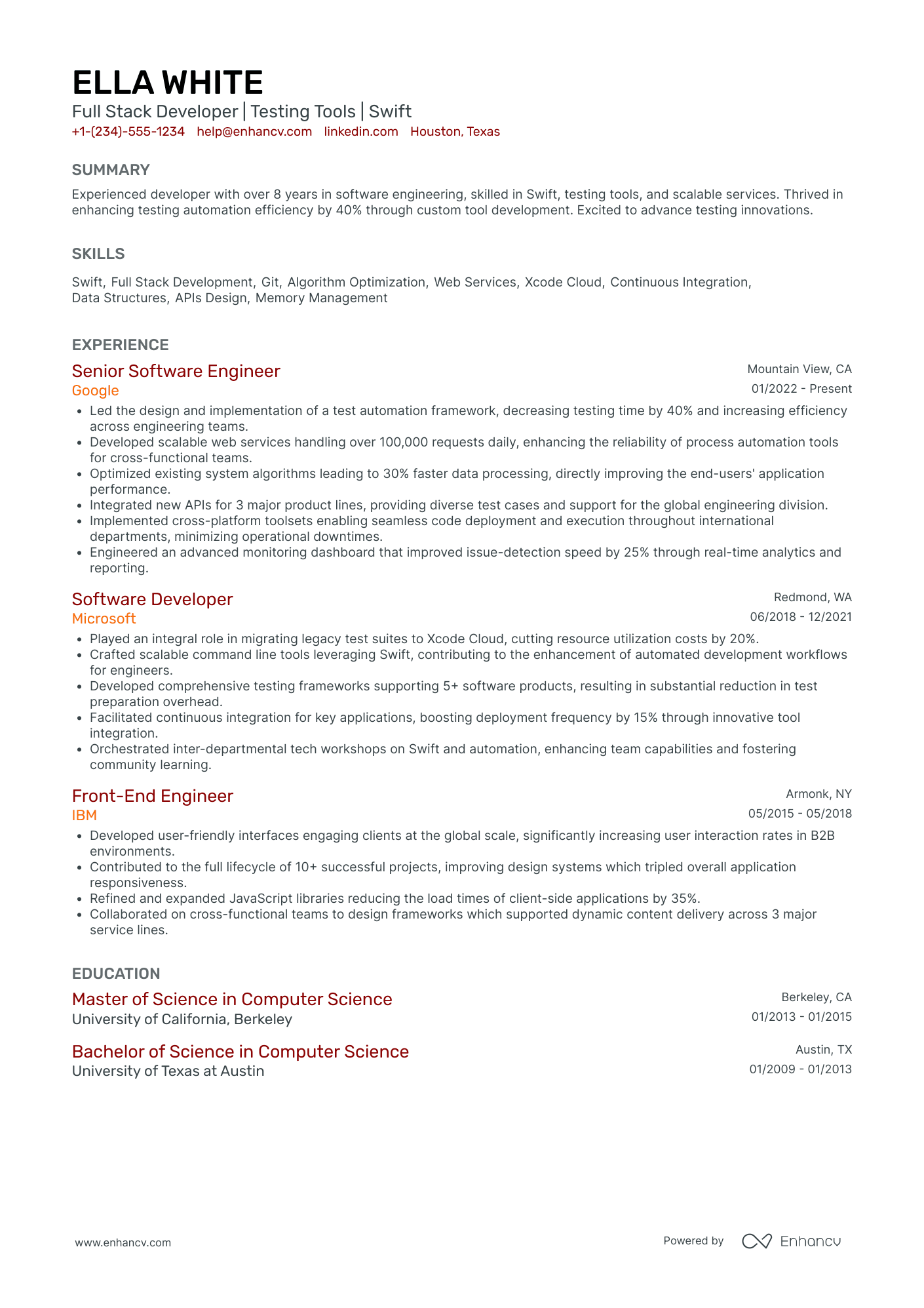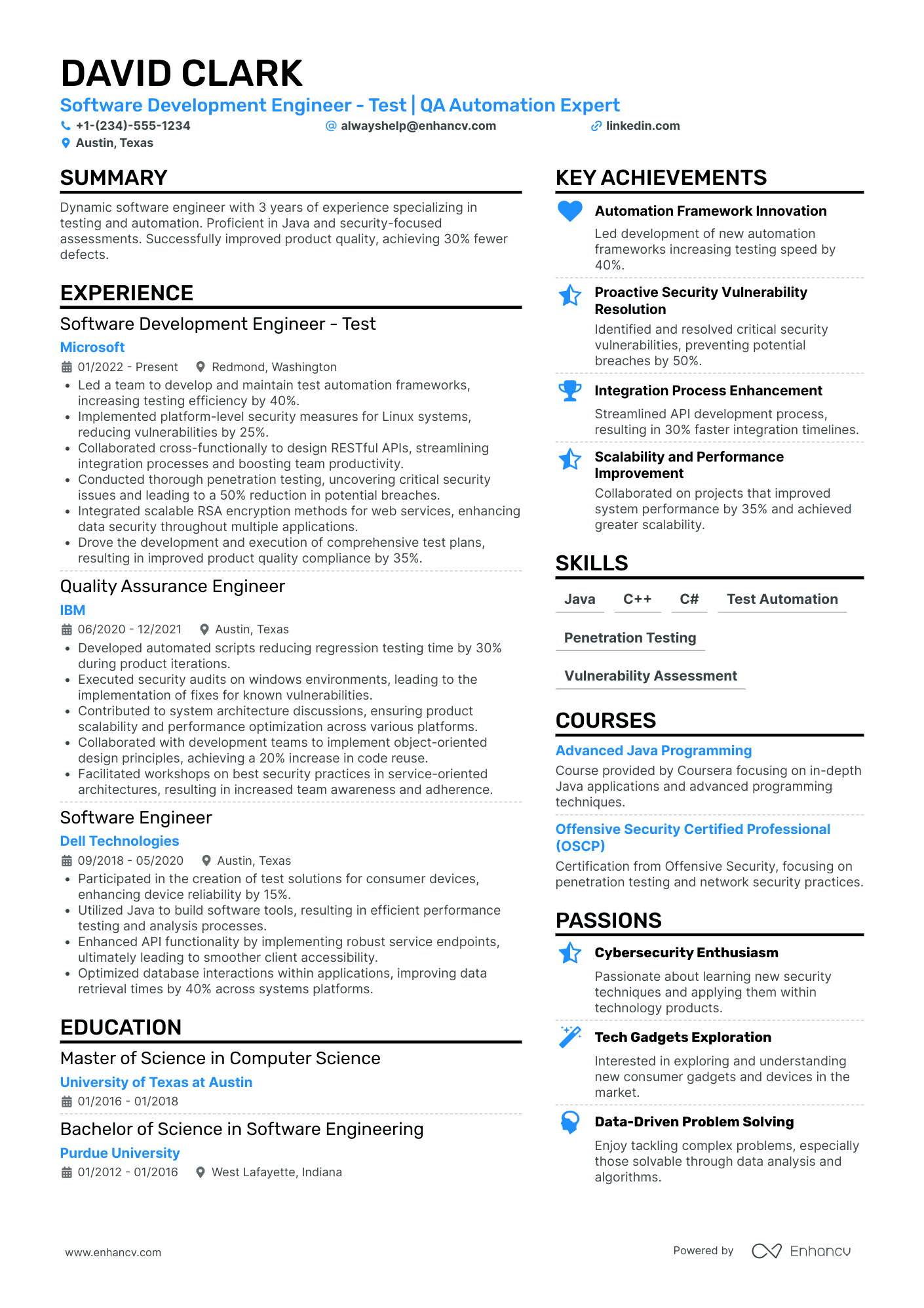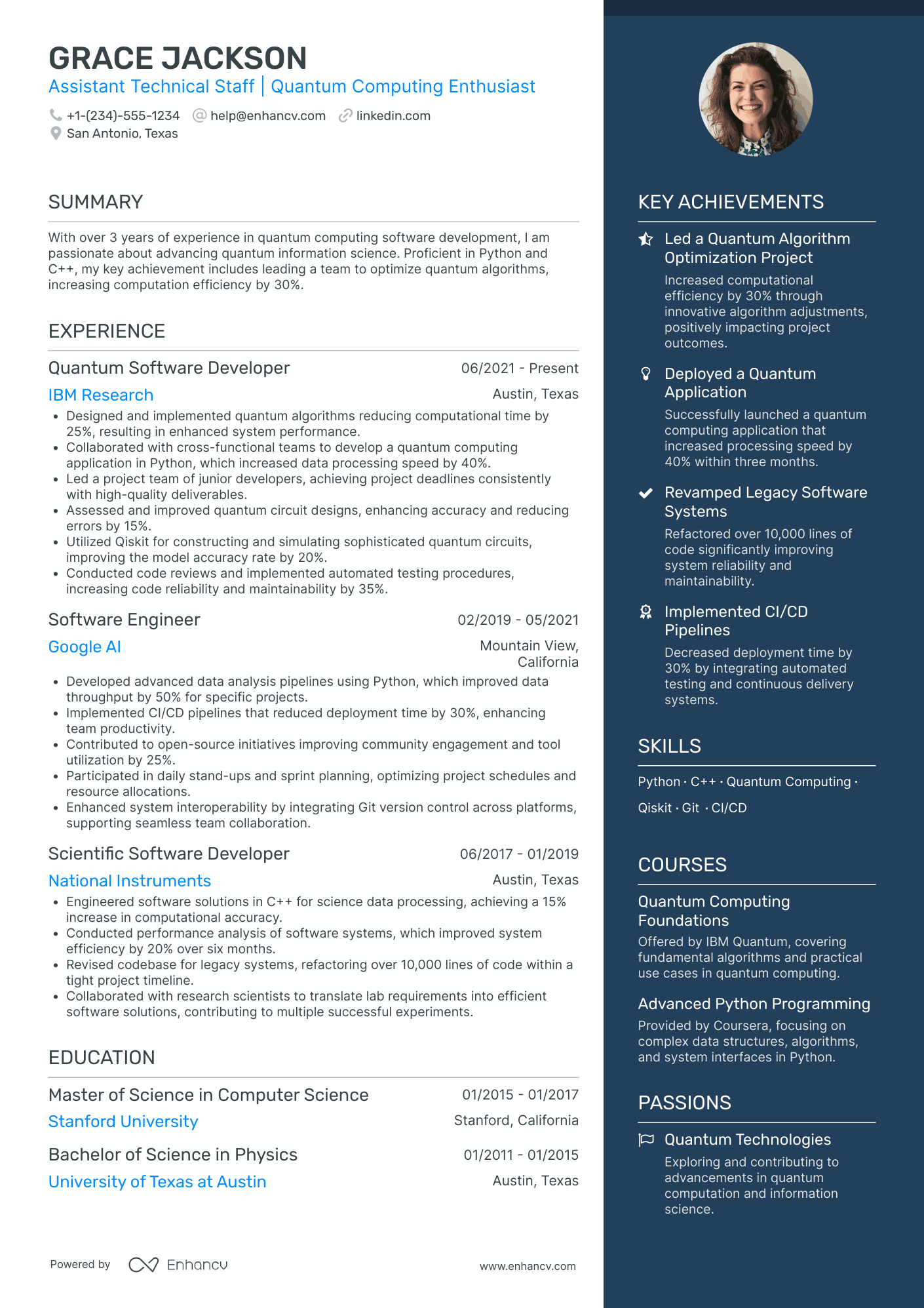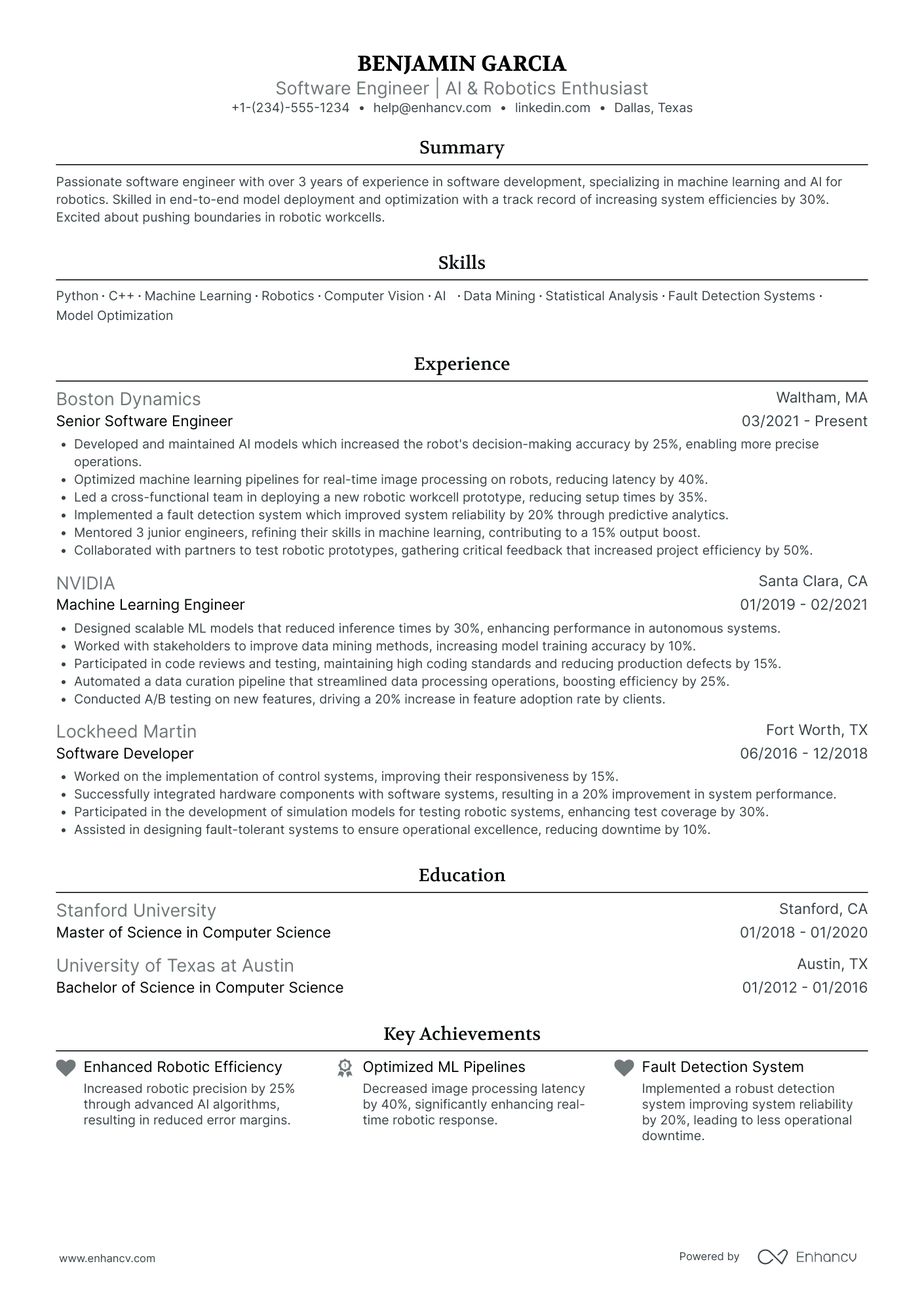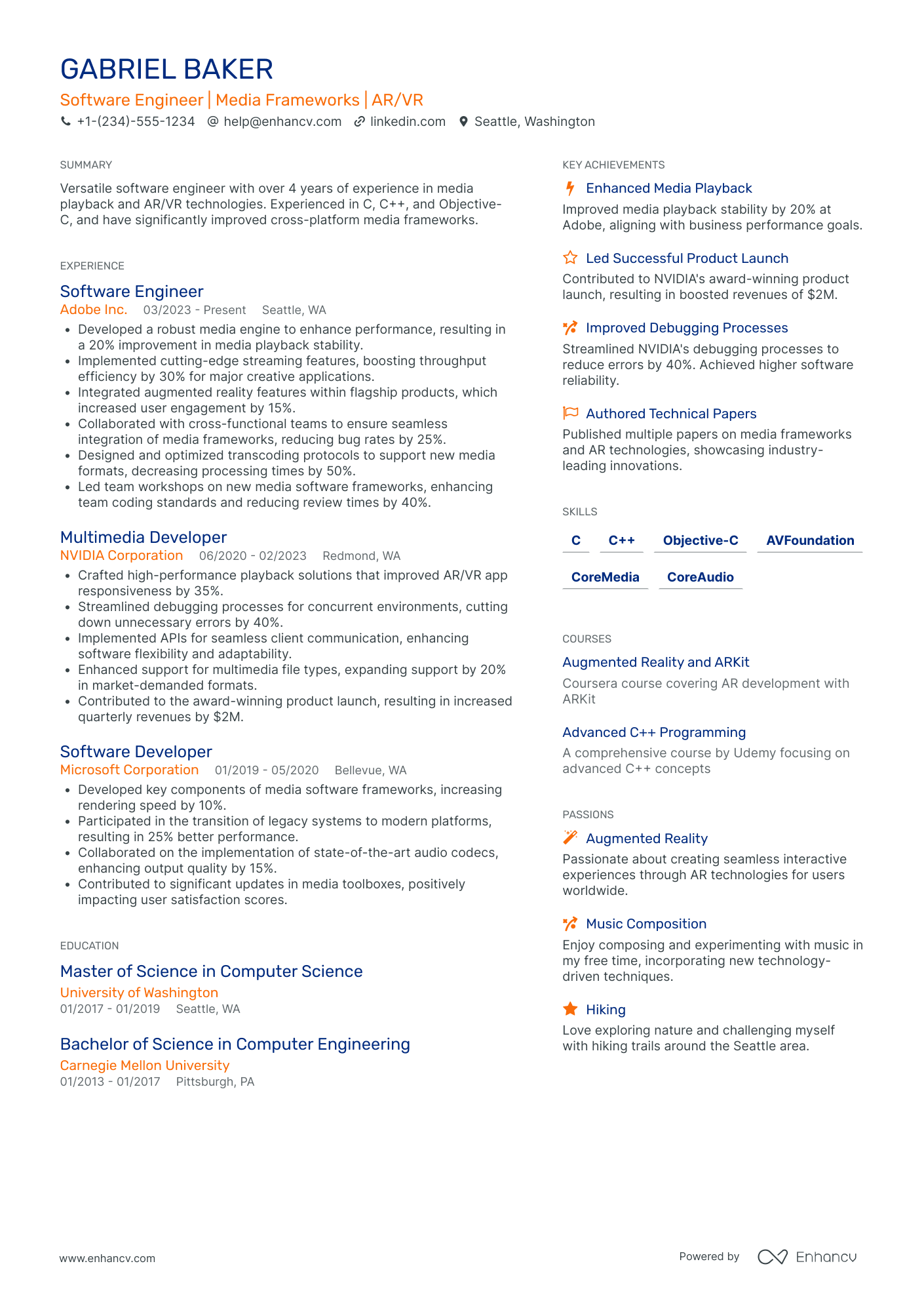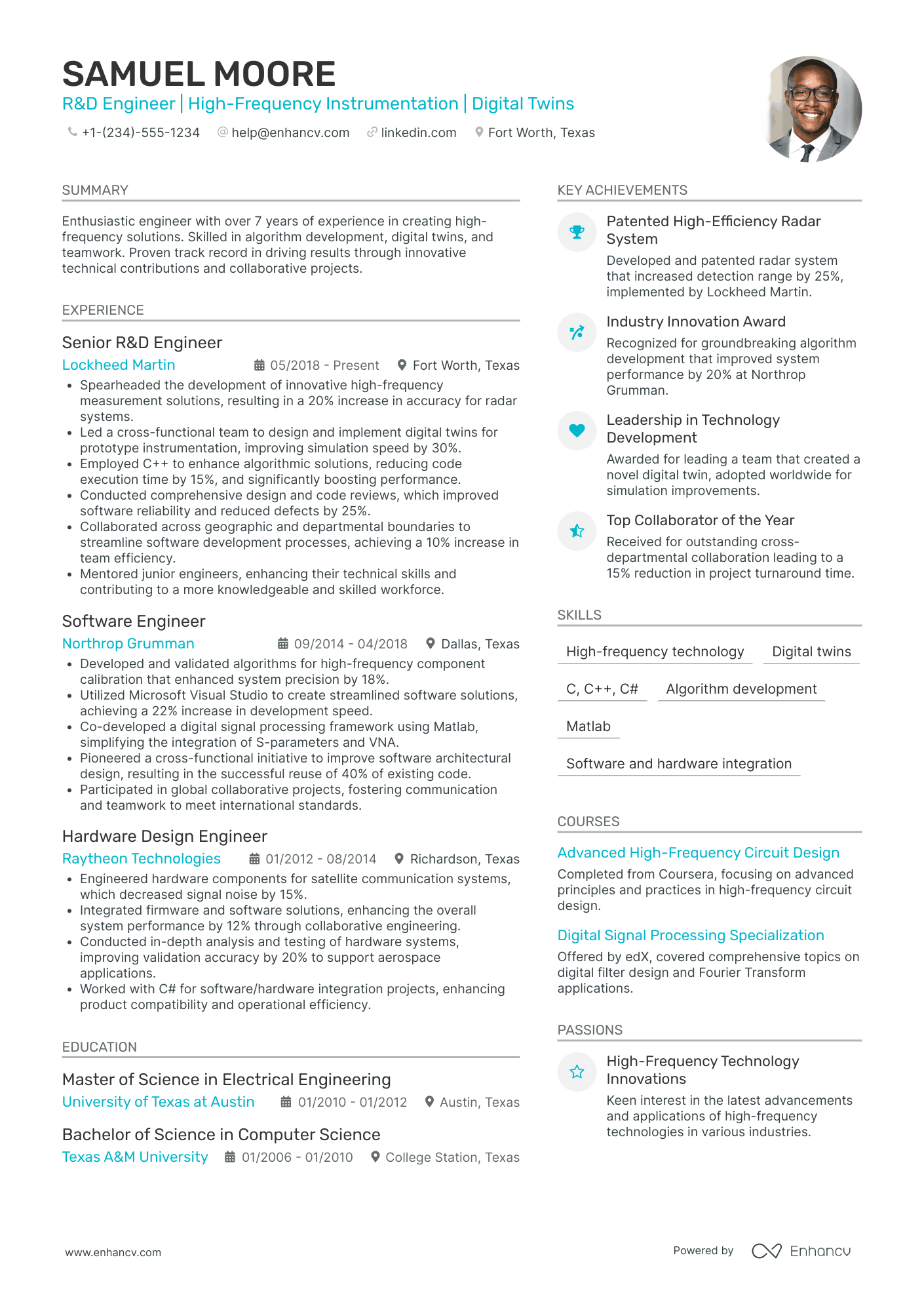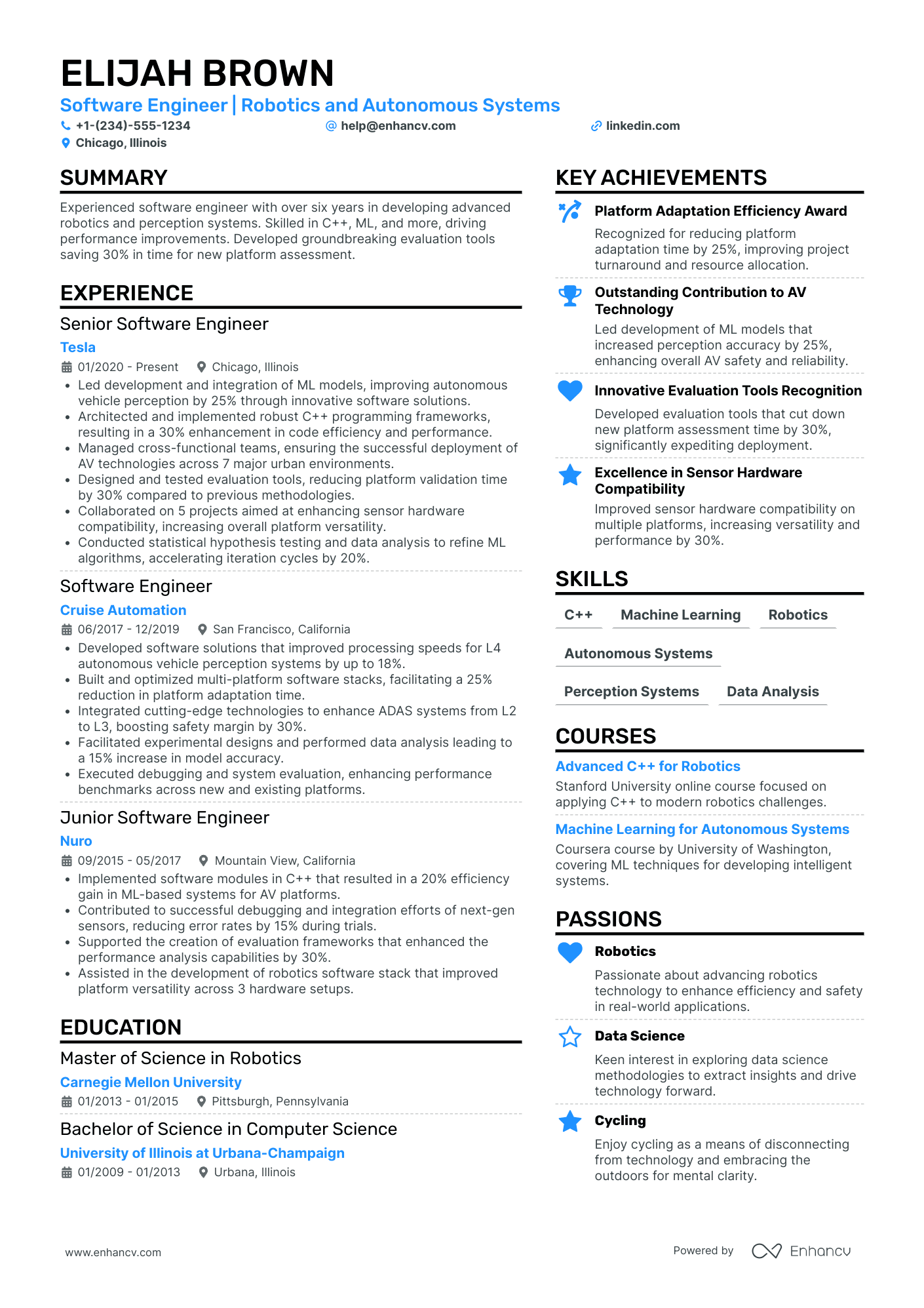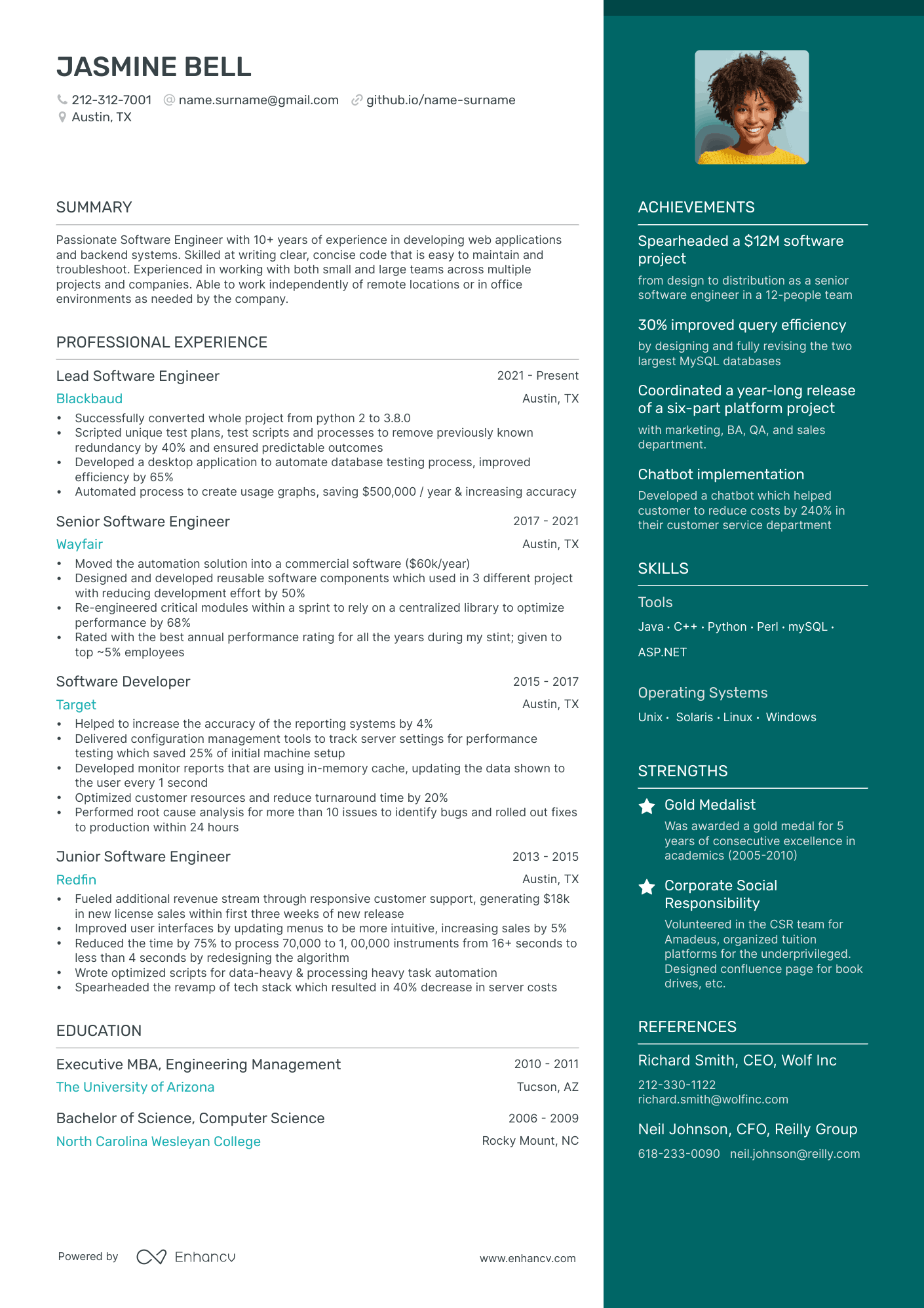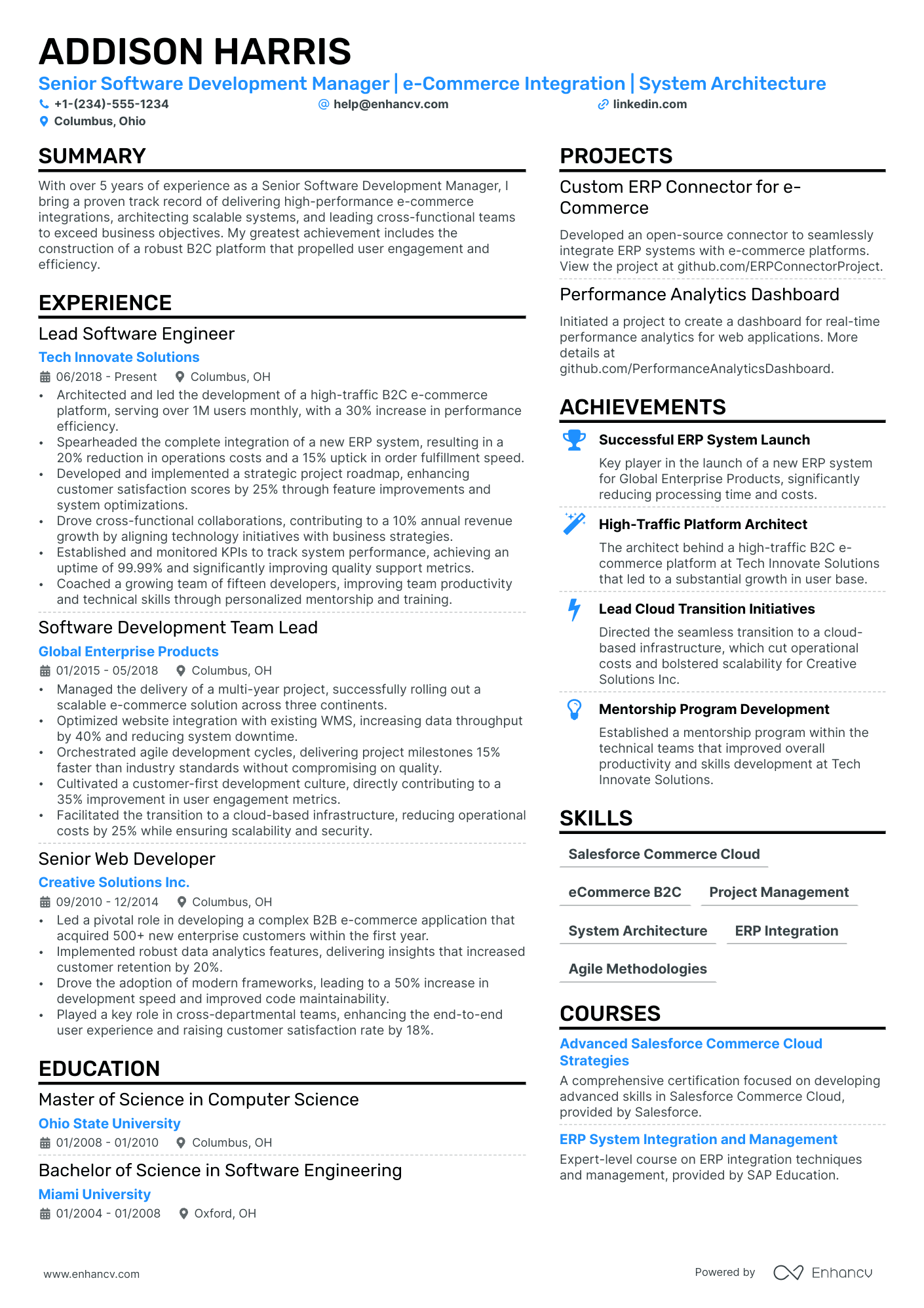As a software engineer, you are like a swiss army knife, able to adapt and meet expectations with whatever task that’s thrown at you. Whether you’re engineering modern applications with JavaScript or designing and implementing PHP web applications, your software engineering success hinges on your ability to innovate and achieve your client’s expectations.
In that same way, you want to create a software engineer resume which achieves your goal: to land your dream job. At Enhancv, our job is to create resumes which allow you to get your foot in the door and to gain a highly sought after interview.
In this article, we will provide you with:
- How to detail your unique software engineer experiences over a wide variety of disciplines, such as mastery of programming languages, web development, and software development methodologies;
- How to summarize your career achievements in delivering scalable and robust software solutions;
- How to highlight your certifications from recognized bootcamps or specialized courses in AWS and Azure.
Before you go on, there are other resume examples with guides that can be relevant for you:
- Front-end developer resume
- Back-end engineer resume
- Full-Stack developer resume
- Python developer resume
- Node.js developer resume
- PhP developer resume
- Net developer resume
Software engineer resume example
What does this resume example do well?
- Focusing attention on their programming skills: First, the author of this resume highlights their knowledge of programming languages. But they also list the operating systems they are comfortable working with, while also highlighting it throughout their resume. In fact, in their achievement section, they even mentioned that they created a unique Chabad which reduced customer costs by 240%.
- Showcasing their achievements through real-world numbers: Right as soon as your eyes glance over to the right side of the page, one phrase immediately sticks out, “Spearheaded a $12M software project.” The author of this resume chose to highlight their achievements through quantifiable, real-world examples. They shared that they increased efficiency by 30%, and successfully coordinated a yearlong project. These points prove to a potential hiring manager they are competent and able to handle a position.
- Highlighting their strengths: In addition, the author of this resume has a large section focused on their strengths. In this section, you can see the author mentions they were gold medalists for excellence in academics for five years.
How to format a software engineer's resume
As a software engineer, you should approach your resume like you would a line of code. When you format your code, you’re not just doing it for aesthetic reasons, but you’re doing it to enhance readability and make the codebase easier to maintain. In that same way, a properly formatted resume can enhance the readability of your resume for a potential hiring manager. In fact, by just making small tweaks to your resume, you can present yourself in a much more appealing way and potentially position yourself to get that much sought-after interview.
Below, you’ll find some helpful tips to keep in mind when you’re formatting your resume:
- Reverse Chronological Format: when drafting your resume, use a reverse chronological format that lists your most recent experience first. This allows an employer to see where you currently are, while also providing them with previous experience to show how far you’ve come.
- Header and contact info: Your resume header is literally the first thing that a recruiter will look at, so it’s important to include important information about you in it. You should include contact information in your header, including your name, phone number, email, location, and possibly even your portfolio or GitHub link.
- How many pages?: Although there is no rule written in stone, it’s best to keep your resume between one and two pages. If you’ve been in the same field for less than 10 years, then one page should work, and more than 10 years, you might need two pages. If possible, only include highly relevant experience on your resume.
- File format: Unless otherwise requested, use the PDF file format. This is because a PDF file format is easier to share than a Word document and the photos and text won’t get shifted around.
Targeting Canada? – Keep in mind their resume layout may differ from others.
Is your resume good enough?
Drop your resume here or choose a file. PDF & DOCX only. Max 2MB file size.
The top sections on a software engineer resume:
- Resume Summary: Your resume summary is your first opportunity to share about your goals and aspirations for your career with a hiring manager. It should be short, between two to four sentences, and should focus on specific skills and abilities that you bring to a teaching environment.
- Experience: Your experience section may be the most scanned section of your resume, so include only the most pertinent work experience for the role.
- Education: Your education section is a key part of your resume, especially in the IT field. If you attended a prestigious university, then it can be an opportunity to showcase the highly specialized skills you picked up at your alma mater.
- Skills section: Your skills section can make you stand out from the crowd. In your skills section, don’t be afraid to brag about yourself, listing your most important skills that apply to the position.
- Certifications, licenses, and awards: As a software engineer, having unique certifications can help you show that you fit a specific niche in a company. For example, if you are an AWS Certified Solutions Architect, include that on your resume because you can show a unique competency with cloud computing.
What hiring managers want to see on a software engineer resume
- Unique technical skills: Recruiters want to see what will add value to the company that you’re applying for, especially knowledge of common programming languages (JavaScript, Python, and SQL), frameworks, tools, and technologies you are proficient in.
- Projects and Contributions: Being a software developer is a creative endeavor, so you can draw the attention of a hiring manager by listing the projects that you’ve completed. Describe your role, the technologies used, and the impact of the project. You may also want to list open-sourced projects and personal pet projects that showcase your passions.
- GitHub or Portfolio: Your resume can only go into so much detail about the projects that you’ve worked on. That’s why you may also wish to include a link to your GitHub profile or portfolio.
- Ability to Collaborate: software engineers move in wide circles, working with several teams in a company ranging from management and the sales department. Having the ability to work in a team is a great asset as a software engineer. Using real, quantifiable examples from your career to highlight your ability to collaborate is best.
How to write your software engineer resume experience
Your resume experience section will be the first thing that a recruiter looks for when they scan your resume. They’ll scrutinize the contributions that you made in your previous role, checking to see what impact you made. That’s why you should bolster your experience and skills with real, quantifiable examples from your career.
Below, you’ll find a list of two experience sections. One of them will be the correct way to fill out an experience section, while the other will be a resume section that falls below expectations. Use both examples as a guideline to create your own:
- •Helped to implement Agile methodologies within a cross-functional team of software engineers.
- •Conducted regular code reviews and mentored junior developers.
- •Actively participated in the evaluation and selection of new technologies and tools to improve development processes.
- •Designed and developed a scalable microservices architecture using Node.js and Docker.
What’s the issue with this resume experience section?
There’s not a single quantifiable example here. What exactly did implementing Agile methodologies do in your previous job? There’s nothing here to show the impact that the applicant made. Also, some of the weak verbs should be changed to active, engaging verbs. The verb ‘helped’ is a weak verb, which could be shifted to ‘collaborated’ or just simply ‘implemented’.
- •Led a cross-functional team of five engineers in the successful implementation of Agile methodologies, resulting in a 20% increase in project efficiency and on-time deliveries.
- •Conducted regular code reviews and mentored junior developers, resulting in a 30% improvement in code quality and adherence to coding standards.
- •Actively participated in the evaluation and selection of new technologies and tools to improve development processes.
- •Designed and developed a scalable microservices architecture using Node.js and Docker, reducing response times by 40% and ensuring high availability for a customer-facing application serving over 1 million users.
What does this do right?
There are quantifiable examples scattered throughout this resume experience section, and this helps to show the impact that the applicant has made in their previous roles. Not only that, but the applicant uses unique keywords of specific programming languages and open-source server platforms which would help their resume make it through a scan by applicant tracking systems (ATS).
Pro tip
Start every one of your bullet points with a power verb to make them super impactful. Examples of power words include collaborated, developed, advocated, facilitated, and transformed.
How to quantify impact on your resume
It’s important to quantify the impact you’ve made in previous roles because you can add credibility to the claims that you make. Chances are, as a software engineer, you’ve spent a great deal of time creating and developing software, fixing bugs, and creating programs and applications that can benefit people. But you likely have spent very little time reflecting on the impact that you’ve made.
Potential hiring managers don’t want to see a bland list of the things that you’ve done. They want to see real-world examples of the difference you’ve made. In order to do this, use the PAR (Problem-Action-Result) method to refine your contributions. List a specific problem and then share the actions you took to achieve a specific result.
Below, you’ll find a list of the top quantifiable achievements to include on your resume:
- Scalability: “Designed and implemented a scalable microservices architecture, enabling the application to handle 3x more concurrent users.”
- Bug Reduction: “Achieved a 15% decrease in post-release bug reports by implementing comprehensive testing suites.”
- Increased Application Performance: “Improved application response time by 30% through code optimization.”
- Efficiency Improvements: “Automated deployment processes, reducing deployment times from 4 hours to 30 minutes.”
- User Growth: “Contributed to a feature that increased user engagement, resulting in a 25% growth in monthly active users.”
- Customer Satisfaction: “Resolved customer issues with a 24-hour turnaround time, leading to a 20% increase in customer retention.”
How to list your hard skills and soft skills on your resume
In the IT field, you’ll likely find it easier to go into detail about the hard (technical skills) that you possess. You have a technical education which has allowed you to develop your coding and programming languages to become proficient in them. No doubt when someone asks what you do for a living, you might list off several technical skills you have and explain how that fits into your role in a company.
These technical skills may form the core of your experience, but you also possess soft (also known as people) skills. Whenever you collaborate with an interdisciplinary team filled with marketing experts, managers, and research and development professionals, you have to use communication skills to explain the decisions and actions you’ve taken.
Below, you’ll find two lists. The first one lists all the hard skills a software engineer should include on their resume. The second will include all the soft skills to include.
Best hard skills for your software developer resume
- Programming Languages: Java, Python, C++, C#, Ruby, JavaScript, PHP, Swift, Go, Kotlin
- Web Development: HTML/CSS, JavaScript frameworks (e.g., React, Angular, Vue.js), Front-end and back-end development, RESTful API design and implementation, Responsive web design
- Database Management: SQL (Structured Query Language), Database design and modeling, MySQL, PostgreSQL, MongoDB (NoSQL), Microsoft SQL Server
- Version Control/Git: Git, GitHub or GitLab
- Software Development Methodologies: Agile (Scrum, Kanban), Waterfall, DevOps practices
- Integrated Development Environments (IDEs): Visual Studio Code, IntelliJ IDEA, Eclipse, PyCharm
- Operating Systems: Linux/Unix, Windows, macOS
Best soft skills for your software engineer resume
- Problem-Solving
- Teamwork
- Adaptability
- Attention to Detail
- Time Management
- Critical Thinking
- Creativity
- Empathy
- Leadership
- Conflict Resolution
- Customer Focus
- Self-Motivation
- Professionalism
- Collaboration
- Open-Mindedness
5 examples of skills to include on your resume:
- Collaboration: “Provided leadership to an interdisciplinary team as the subject matter expert on hosting issues, staff and customer logins, and upgrades to servers.”
- Problem-solving skills: “Created ecommerce sites integrated with PayPal, Authorize.net, and other payment APIs. Navigated issues related to a complex ecommerce site.”
- Leadership: “Led a team of 5 programmers to structure several internal systems, including custom REST APIs through Python.”
- Attention to detail: “Refined the application’s features to root out and fix bugs, which optimized overall performance, efficiency, and reliability.”
- Adaptability: “Modified and designed HTML, JavaScript, and CSS web pages in order to optimize the performance for quicker loading.
How to list your certifications and education on your resume
In the IT field, possessing the right education and certifications can make all the difference in finding the right job. In fact, if you possess the right educational background and certifications, you may be able to win job offers over more experienced software engineers.
Here’s what you need to include when listing your education on your resume:
- The name of the degree
- The name of the school
- The location of the school
- The years you attended the school
- GPA (optional)
- Honors or extra-curricular involvement (optional)
Listing certifications on your resume:
- Add the title of the certification
- List the name of the awarding organization
- List the date that you acquired your certification
- Mention the date when it will expire
Best certifications for your software engineer resume
- AWS Certified Solutions Architect – Associate (AWS-CSA)
- Microsoft Certified: Azure Developer Associate
- Certified Kubernetes Administrator (CKA)
- Certified Ethical Hacker (CEH)
- Certified Information Systems Security Professional (CISSP)
- Google Associate Cloud Engineer
- Oracle Certified Professional, Java SE 8 Programmer (OCPJP8)
- Certified ScrumMaster (CSM)
- Red Hat Certified Engineer (RHCE)
- PMI Agile Certified Practitioner (PMI-ACP)
How to write your software developer resume summary or objective
There is a big difference between a resume summary on a resume objective. A resume objective, also known as an objective statement, is a short, position-focused statement that describes the value that you could add to the position you’re applying for. A resume objective tends to be used more for those who are new to the field, or those without as much experience.
You can use bullet points in your resume objective to help break up a large paragraph of text. It also helps to draw the eye to each of the individual unique skills you possess.
In contrast, a professional summary goes into a little more detail than a resume objective does. Resume summaries go into more depth about how each unique set of skills you possess will aid the company. Using real-world, quantifiable examples, a resume summary should effectively build your case on why your experience shows you’ll be the best candidate to fill the position. Resume summaries can be used by those who have more experience under their belt.
Let’s first examine a couple of resume objectives for software engineers, and see what they do bad and well.
One major issue with his resume objective is that it lacks specific details about the technical skills that the applicant possesses. Don’t be afraid to explain individual skills that you highlight later on in your resume.
What does this example do right?
It’s a lot more specific, going into more detail about the skills and abilities that the applicant possesses. Not only does it mention programming languages, but it also mentions their unique background in database management and cloud technologies.
Now, let’s move on to resume summaries and focus on how to do them well and what to avoid.
This resume summary doesn’t have the same impact as the one you will read below. It misses the unique programming languages that the applicant possesses, as well as not possessing powerful words. For what could be a great resume summary, it falls lifeless and flat.
Conversely, not only does it showcase all the unique programming languages and skills the applicant possesses, but it also shows that the applicant is looking for a new challenge. This shows someone who is driven to create an impact and to innovate.
Optimize your resume summary and objective for ATS
Drop your resume here or choose a file.
PDF & DOCX only. Max 2MB file size.
Cover letter matching your software engineer resume
Cover letters are important because they allow a hiring manager to learn a little more about you than what your resume can offer. In your cover letter, be sure to go into more depth about the skills and experience you possess, while also showing how you are interested in the position you’re applying for.
Below, you can find a list of tips to help you craft your cover letter:
- Cover letter header: Make sure to include all the contact information that you provided in your resume and make sure that they match.
- Address the letter to a hiring manager: Do your best to find the specific person who is hiring for the position. If you tailor your cover letter to a specific hiring manager, it’ll show that you took the time to find out their name and put it on the cover letter.
- Write a salutation and introduction: Begin your cover letter with a salutation like “Dear ___” and then write an introductory paragraph. Your introductory paragraph should give a first taste of who you are. It should also include a bit of information about why you are interested in working at the company you’re applying for.
- Describe technical and soft skills: Next, include some specific skills that you possess. Make sure to quantify and provide real-world examples of the skills.
- Call to action: Finish off your cover letter with a call to action, a specific statement that provokes a response. This can include asking them to contact you through email or your phone number provided.
Check our software engineer cover letter here.
Software Engineer resume examples
By Experience
Software Engineer Intern
Software Engineer New Grad
Entry Level Software Engineer
You're likely to gain more software development knowledge during your initial months on the job than throughout four years as a computer science major.
Both technical and non-technical recruiters appreciate real project experience, as it demonstrates your ability to thrive in a production environment, collaborate with a team, and adhere to guidelines.
If your work history is sparse, focus on presenting your experience through software projects. Side applications, contributions to open-source code, and even relevant Fiverr gigs can give you a competitive advantage over candidates with less experience.
Your GitHub profile can be a wildcard in the hiring process. Some recruiters may scrutinize it to make their decision, while others might disregard it completely.
Prepare for the possibility that someone will review your GitHub page. What will they find? Unnecessary comments? An empty profile? Regardless of whether the code was written three or five years ago, your work will be evaluated based on today's standards.
Include your GitHub link on your resume only if you believe it adds value. Otherwise, it could work against you.
Junior Software Engineer
Mid-Level Software Engineer
Mid-level software engineers are indeed the "workhorses" of the programming world. They deliver significant impact through routine code, optimize their workflows precisely, and exhibit excellent coding habits.
Highlight the following qualities in the context of your software projects to present yourself in the best light:
- Ability to deliver substantial amounts of work with minimal or no supervision;
- Active collaboration with team members and team leads;
- Deep understanding of platforms and tools relevant to the target company's tech stack.
Senior Software Engineer
Beyond operating independently at a highly-skilled level, senior software engineers are also capable of leading teams and serving as mentors.
When applying for senior positions, concentrate on your team's achievements and collaboration, rather than your personal accomplishments. Tech companies seek senior software engineers who can effectively guide less-experienced staff.
Examine the size of your target company's software department and emphasize experience with teams of comparable sizes. Showcase your successes as a leader and prove your ability to consistently solve company problems.
Structure parts of your experience using a challenge-solution-business outcome framework to attract the attention of your dream company.
Lead Software Engineer
By Role
Associate Software Engineer
Director Of Software Engineering
Embedded Software Engineer
Principal Software Engineer
Software Development Engineer
Software Development Manager
Software Engineering Manager
Software Specialist
Software Support Engineer
Software Team Lead
Staff Software Engineer
Full Stack Software Engineer
- Strategic Presentation and Conciseness - The resume is remarkably clear and structured, effectively presenting key information in a concise manner. It utilizes sections that are well-defined, e.g., experience, education, and achievements, making it easy for potential employers to quickly locate and assess the candidate's qualifications. The bullet points under each job title succinctly convey critical accomplishments and responsibilities, maintaining the reader's attention.
- Progressive Career Development - The career trajectory of Charlotte Jones exhibits a clear progression from a Web Developer to a Senior Full Stack Developer, reflecting significant professional growth. Over the years, her role expansions across different companies in the tech sector demonstrate an upward career path and increasing responsibility, particularly in full-stack development and agile methodologies. Her promotions signal a consistent enhancement of her skills and recognition of her capabilities.
- Technical Prowess and Industry-Relevant Skills - Charlotte's resume highlights unique, technical depth with a diverse range of programming languages and technologies, including Java, Python, React, and NodeJS. Her experience in agile methodologies and software engineering practices, coupled with an understanding of security protocols and machine learning, illustrates her comprehensive technical skill set. This mastery is crucial for her role as a full-stack developer and appeals directly to industry-specific needs.
Machine Learning Software Engineer
- Strategic Career Progression - Ava’s resume clearly maps a strategic upward trajectory in her career, beginning from a specialist role at IBM to a senior engineering position at Google. This progression not only highlights her ability to grow within the tech industry but also her capability to take on increasingly complex challenges and responsibilities, indicating her competence and dedication.
- Technical Proficiency and Innovation - The resume is replete with industry-specific technical competencies, ranging from machine learning integration to GPU acceleration, showcasing Ava’s deep understanding of cutting-edge computer vision and machine learning technologies. Additionally, her involvement in patent holding and open-source contributions further underscores her drive for innovation and technical depth.
- Outstanding Achievements and Impact - Ava's accomplishments are presented with contextual business impact, such as developing a vision system that increased product adoption by 40% at Google, demonstrating her role in driving significant business success. Furthermore, multiple awards for technical innovation and team excellence showcase her ability to contribute to and lead high-impact projects.
Cloud Software Engineer
- Clear and Structured Content Presentation - The resume effectively organizes information using distinct sections such as experience, education, skills, and achievements, allowing for quick and easy navigation. Each job role is described with concise bullet points that highlight key responsibilities and accomplishments, ensuring clarity and focus.
- Progressive Career Trajectory - The candidate's career path demonstrates significant growth, with steady promotions from Software Developer II at Microsoft to Senior Database Engineer at AWS. This trajectory reflects a deepening expertise and increased responsibility in the field of database development and cloud infrastructure.
- Advanced Technical Depth in Database Technologies - The resume highlights a wealth of industry-specific skills and tools, showcasing proficiency in MySQL, PostgreSQL, and various programming languages like Go, C/C++, and Python. Additionally, the emphasis on database optimization, system design, and distributed systems underscores a solid technical foundation.
Mobile Software Engineer
- Comprehensive Career Growth - Sebastian's resume exemplifies a natural career progression, starting from a Software Engineer position at Netflix, advancing to a Software Development Lead at Apple, and securing the Senior Software Engineer role at Google. Each step shows a clear increase in responsibilities, impact, and leadership, demonstrating a trajectory of continuous growth and adaptability in top-tier tech environments.
- Emphasis on Technical Prowess and Innovation - The resume effectively highlights Sebastian's proficiency in Java, Python, and scalable system architectures, signifying technical depth and innovation. This is coupled with his involvement in real-time data processing and microservices architecture, which showcases his capability in handling complex, large-scale systems, a key aspect for a Senior Software Engineer role.
- Impactful Achievements with Business Relevance - Sebastian's accomplishments are not just impressive metrics but are deeply tied to business outcomes. For example, his leadership in designing a logistics platform that reduced delivery times by 25% underscores a direct positive business impact. Similarly, awards like the Innovative System Design Award reflect contributions that enhance logistics efficiency, reiterating a strong alignment with business goals.
Systems Software Engineer
- Structured Presentation - Andrew Green's resume presents information clearly and concisely, starting with personal details and followed by sections dedicated to a professional summary, work experience, education, skills, courses, achievements, languages, and passions. Each section is well-organized, making it easy for employers to navigate through Green's qualifications and accomplishments.
- Robust Career Progression - The resume illustrates Green's impressive career trajectory, showing a steady progression in roles from DevOps Engineer to Senior Software Systems Engineer. This advancement reveals a history of promotions and increasing responsibilities, highlighting the candidate's growth and adaptability in the ever-evolving tech industry.
- Comprehensive Skill Set for Industry Specificity - Green's resume showcases a diverse skill set encompassing both technical and management skills relevant to the software engineering field. Proficiencies in DevOps, CDRL development, and CI/CD pipelines reflect a deep technical expertise, while skills in project management and leadership emphasize the candidate's capability to guide and improve team performance.
Security Software Engineer
- Structured and Concise Presentation - The resume's structure and clarity stand out, presenting a well-organized layout with sections such as experience, education, skills, and achievements neatly categorized. Each section is concise, making it easy for the reader to quickly grasp the candidate's qualifications and accomplishments without being overwhelmed by dense text.
- Progressive Career Trajectory - John Walker's resume illustrates a strong career progression within the cybersecurity and cloud services industry. The candidate's transition from a Software Engineer to a Cloud Security Engineer highlights his growth, both in technical capability and leadership roles, showcasing a consistent upward trajectory that aligns with the demands of the field.
- Specialized Technical Expertise - The resume highlights John's depth in industry-specific tools and methodologies, particularly in utilizing C# and Azure for enhancing cybersecurity measures. His experience with advanced cloud solutions and attack simulation platforms demonstrates a profound technical expertise that is critical for innovation in cybersecurity engineering.
Front-End Software Engineer
- Clear and Structured Presentation - The resume is presented with a logical flow, starting with personal details, followed by a succinct yet comprehensive summary of qualifications. Each experience entry is detailed with bullet points that make it easy to digest key achievements and responsibilities, aiding in a clear understanding of the candidate's career progression.
- Technical Expertise and Methodologies - Riley Nelson's resume effectively highlights industry-specific tools and methodologies. Emphasizing expertise in Java, Kotlin, and Kubernetes, along with advanced knowledge of SOA-based services, shows a deep technical proficiency crucial for a Senior Software Engineer in cybersecurity and software architecture contexts.
- Leadership and Soft Skills - Not only does the resume showcase technical credentials, but it also reflects strong leadership skills. Examples such as mentoring junior engineers and fostering a culture of continuous improvement illustrate Riley's capability to lead teams and drive organizational success through strategic human resource development.
Back-End Software Engineer
- Content presentation and clarity - Avery’s resume displays exceptional clarity and structure, making it easy for readers to extract pertinent information quickly. The organized layout, with clear headings for each section and bullet points for each role, ensures that key achievements and responsibilities stand out effectively. The concise presentation aids in communicating Avery's rich experience and qualifications succinctly.
- Career trajectory and growth - The resume highlights a clear progression in Avery's career from a Systems Analyst at Cognizant to a Software Engineer III at TechMahindra. This trajectory showcases Avery’s growth and increasing responsibilities over time. This steady advancement indicates an upward career path marked by promotions and recognition of expertise in software engineering.
- Achievements and their business relevance - Avery’s resume doesn’t just list achievements but also ties them to significant business impacts, such as reducing rollout time by 30% and increasing system efficiency by 20%. These metrics not only highlight technical prowess but also demonstrate Avery's value to previous employers in terms of operational improvements and productivity enhancements.
DevOps Software Engineer
- Emphasizes Technical Proficiency with Industry Tools - The resume effectively demonstrates Oliver Davis's technical depth by prominently featuring his expertise in cutting-edge technologies like Kubernetes, Docker, and Python. This choice of tools aligns perfectly with the typical demands of a Senior Software Engineer, especially in DevOps environments, emphasizing his readiness to tackle complex system integrations and optimizations.
- Illustrates a Steady Career Growth and Specialization - Oliver's career trajectory is highlighted through progressive roles and responsibilities, moving from Software Engineer to Senior Software Engineer. Each role builds upon the last, showcasing a clear pathway of professional development and specialization, particularly in the areas of DevOps and cybersecurity, reflecting a strong strategic focus in his career.
- Showcases Leadership and Cross-Functional Collaboration - Throughout the resume, emphasis is placed on Oliver's leadership skills and ability to work across various departments. Examples of collaboration with cross-functional teams and spearheading critical initiatives demonstrate not only technical expertise but also his capacity to lead and drive significant technological changes within an organization.
Software Engineer, Tools
- Clear and Structured Presentation - The resume is organized with clarity in mind, employing distinct sections for the summary, experience, education, skills, achievements, and more. This structure enhances readability, allowing potential employers to quickly scan for pertinent information about Ella's qualifications and career accomplishments.
- Progressive Career Growth - Ella White's career trajectory showcases a steady progression through the tech industry. Starting as a Front-End Engineer at IBM and advancing to a Senior Software Engineer role at Google, her career path illustrates significant professional growth and development in complex, high-profile positions across major tech companies.
- Industry-Specific Expertise in Tool Development - The resume highlights Ella's depth of experience in developing testing and automation frameworks, including those that have led to increased efficiencies by 40%. Her proficiency in Swift, testing tools, and scalable services demonstrates a specialized skill set that is highly relevant in today's fast-evolving technological landscape.
Software Engineer in Test
- Structured and Concise Content Presentation - The resume is well-organized with clear headings for sections such as experience, education, skills, and achievements. This structure allows for quick scanning and ensures that key aspects of David's qualifications stand out immediately, demonstrating his expertise as a Software Development Engineer in Test and a QA Automation Expert.
- Progressive Career Trajectory - David's career shows a clear upward trajectory, moving from a Software Engineer role at Dell Technologies to a Software Development Engineer - Test at Microsoft. This progression reflects his growth in responsibilities and expertise, clearly positioning him as a leader in software testing and quality assurance automation.
- Specialized Technical Skill Set - The resume highlights industry-specific skills such as test automation, penetration testing, and vulnerability assessment. David also demonstrates proficiency in security for both Linux and Windows systems, indicating a deep technical understanding and the ability to address contemporary cybersecurity challenges.
Quantum Software Engineer
- Emphasis on Quantum Computing Expertise - The resume stands out for its profound focus on quantum computing, showcasing proficiency in specialized tools and languages like Qiskit, Python, and C++. The candidate’s involvement in optimizing quantum algorithms and enhancing computational efficiency demonstrates a deep technical understanding of the field.
- Leadership and Mentorship Skills - Throughout the career trajectory, leadership roles are evident, such as leading a team at IBM Research to improve quantum algorithms. The resume highlights mentorship capabilities with junior developers, indicating strong team management and project oversight skills, critical in a collaborative research environment.
- Diverse Industry Experience - The transition from roles at Google AI to National Instruments and IBM Research reflects significant growth and adaptability across diverse technological sectors. This career path showcases the ability to apply scientific software development skills to various industries, demonstrating versatility and a wide-ranging impact.
Robotics Software Engineer
- Clear Career Progression and Growth - The resume illustrates a steady career progression, showcasing Benjamin’s advancement from a Software Developer at Lockheed Martin to a Senior Software Engineer at Boston Dynamics. This trajectory highlights consistent growth and an ability to take on more complex roles and responsibilities over time.
- Emphasis on Cross-functional and Teamwork Skills - Benjamin’s experience notes significant involvement in cross-functional teams, notably leading a team in deploying a new robotic prototype. Additionally, his mentoring of junior engineers indicates strong leadership skills and an ability to elevate team performance.
- Impact-Driven Achievements with Quantifiable Results - The achievements highlighted in the resume are supported by quantifiable results, such as a 25% increase in decision-making accuracy, a 40% reduction in latency, and a 35% reduction in setup times. These metrics demonstrate a tangible impact on the business and underline Benjamin's effectiveness in his roles.
AR/VR Software Engineer
- Clarity and Structured Presentation - This resume stands out due to its clear and concise layout with sections clearly delimited, ensuring readability and easy navigation. Each section is thoughtfully organized, from a precise summary to a detailed account of professional experience, education, and achievements, supporting a coherent narrative of the candidate's career.
- Impressive Career Progression - Gabriel Baker's career trajectory is noteworthy, showing a clear progression from a Software Developer at Microsoft to a Software Engineer at Adobe Inc. The advancements in roles depict an ascension into more complex responsibilities and projects, demonstrating professional growth and increasing trust from top industry players in media frameworks and AR/VR technologies.
- Industry-Specific Technical Expertise - The resume showcases a deep understanding of industry-specific tools and methodologies such as AVFoundation, CoreMedia, CoreAudio, and AR/VR technologies. Gabriel's experience in C, C++, and Objective-C underlines high technical proficiency, and his involvement in developing media engines and AR integrations directly speaks to his specialized skill set in the software and technology sector.
Research Software Engineer
- Structured Career Progression - Samuel Moore's resume clearly outlines a logical career trajectory, showcasing growth from a Hardware Design Engineer to a Senior R&D Engineer. This progression highlights his ability to take on more complex and impactful roles, reflecting an upward trend in responsibility and impact within major tech firms such as Raytheon Technologies, Northrop Grumman, and Lockheed Martin.
- Technical Depth in Tools and Methodologies - The resume effectively emphasizes Samuel’s strong proficiency with industry-specific tools like C, C++, C#, Matlab, and Microsoft Visual Studio. His expertise in high-frequency technology and digital twins further demonstrates a specialized skill set that is crucial for high-tech engineering roles, particularly within aerospace and defense sectors.
- Impactful Achievements and Business Value - Each experience bullet point is backed by significant achievements, such as increasing radar system accuracy by 20% and improving simulation speed by 30%. These accomplishments not only highlight his technical prowess but also his ability to deliver tangible business outcomes, showcasing the strategic importance of his contributions in past roles.
Platform Software Engineer
- Demonstrates Advanced Technical Proficiency - Elijah Brown’s resume is impressive in its demonstration of deep expertise in robotics and autonomous systems, especially through the consistent emphasis on C++ and machine learning. His hands-on experience in developing evaluation tools and frameworks seems crucial in driving the efficiency and effectiveness of the autonomous systems the engineer worked on.
- Dynamic Career Progression - The resume illustrates an impressive career trajectory showing clear upward mobility—from a Junior Software Engineer at Nuro to a Senior Software Engineer at Tesla, indicating a significant rise in responsibility and expertise. This progression is further demonstrated by the increasing complexity and magnitude of his projects.
- Concrete Achievements with Quantifiable Business Impact - A distinct aspect of this resume is the quantification of achievements and their direct relevance to business operations. By mentioning improvements like a 30% enhancement in code efficiency and a notable reduction in platform adaptation time by 25%, Elijah showcases his contributions in terms of real-world business benefits, emphasizing his impact on cost, time, and resource efficiency.
Key takeaways
- Use a reverse chronological format to create your software developer resume, as it allows you to list the most recent experience first.
- Hiring managers want to see an aptitude for using programming language, as well as real-world examples of projects that you’ve worked on.
- Do your best to quantify all achievements you make. You can do this by using the PAR (Problem-Action-Result) method.
- Include both technical and soft skills on your resume to provide a more well-rounded view of your abilities.
- List your education and certifications, including any awards or honors you received.
- Tailor your resume objective or summary specifically to the role that you’re applying for, showcasing through your skills and abilities why you think you’re the best candidate for the position.
- By crafting a cover letter, you can go into a bit more detail about who you are and why you think you are a good fit for the company.
